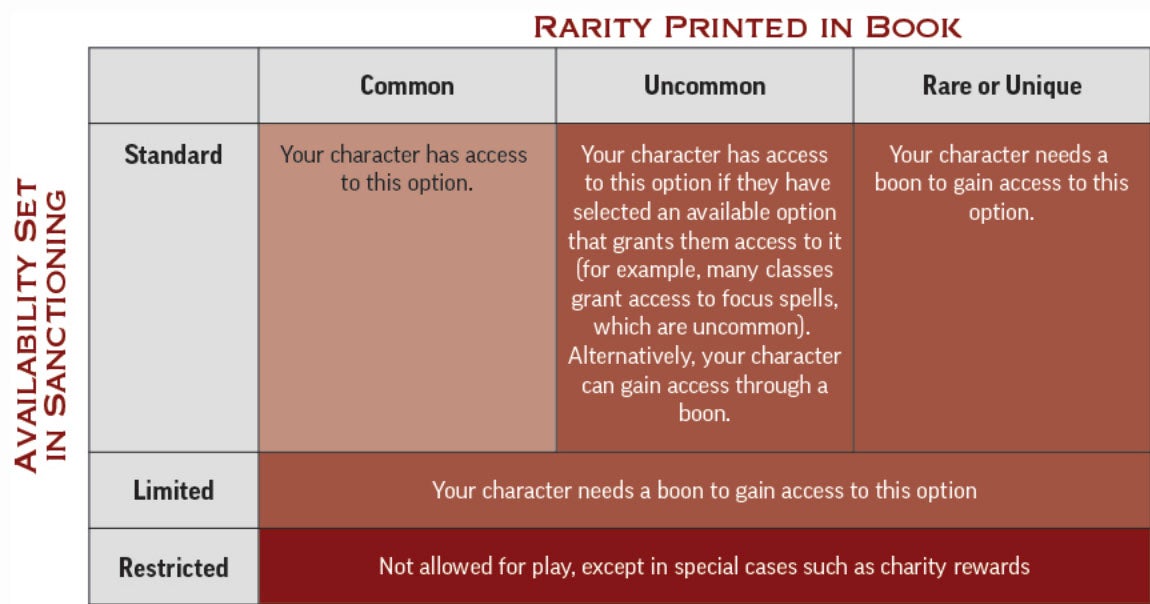
Additional Resources: Character Options
The following page outlines character rules options available for use in the Pathfinder Society organized play campaign. The Guide to Organized Play: Pathfinder Society contains specific information on building Society legal characters, including step by step guidance.
Be sure to check limitations when selecting character options.Some items, such as ancestry rewards, must be the first chronicle applied to a character or applied during rebuilding a character of less than 12 XP.
Rarity
Pathfinder Society uses the Rarity system (Common, Uncommon, Rare, Unique) as described in the Pathfinder Core Rulebook page 13.
Access
Characters can gain access in a variety of ways. They can gain access by virtue of their origin, religion, or their membership in certain organizations. Selecting certain common character options can give you access to other, rarer ones; for instance, a gnome who takes the Gnome Weapon Familiarity ancestry feat gains access to uncommon gnome weapons. Specific boons—such as from the Achievement Points system or Chronicle Sheets—can also grant access to these options. For more information, consult the Character Creation Appendix in the Guide to Organized Play: Pathfinder Society.
Availability
Character options for Pathfinder Society play have one of three levels of availability: standard, limited, or restricted.
Standard: These options follow the standard rules as printed in their respective sourcebooks. If a character wants to take this option, they must meet all its prerequisites as usual. If the option is uncommon or rarer, they must also have access to the option.
Limited: A limited option is rarer in Society play, but not unheard of. A limited option can be selected only if specifically allowed by a boon—whether from the Achievement Points system, a Chronicle Sheet, or another other option from a Pathfinder Society source—even if the option is common or if the character meets the normal prerequisites or access requirements printed in the option’s source.
Restricted: A restricted option is one that is not generally appropriate for all tables or conducive to the Pathfinder Society's shared campaign setting, such as a one-of-a-kind weapon, a horrific spell used by only the most evil magic-users, or player options that require high degrees of GM adjudication. Such options will generally be made available for Society Play in only a very few special cases, such as via boons given out as part of charity events, if at all.
-
Ownership of the Core Sources is not required for Character Option use in the Pathfinder Society campaign, as long as rules are referenced from the official Pathfinder Resource Document (prd).
The Core Sources currently are: the Pathfinder Player Core, Pathfinder GM Core, Pathfinder Monster Core, Pathfinder Core Rulebook, Pathfinder Bestiary, and Lost Omens World Guide
-
-
Typically, characters cannot select options from a Pathfinder Adventure. However, Chronicle Sheets from sanctioned Adventures or boons from the Achievement Points store often grant characters access to options from these Adventures.
Ownership of Adventures or Adventure Path volumes is not required to use Character Options printed on Chronicle Sheets in the Pathfinder Society campaign, as long as option rules are referenced from the official Pathfinder Resource Document (prd).
-
-
To use an option from any source other than those discussed above in Pathfinder Society play, you must bring any one of the following to your game table:
- A physical copy of the book you wish to use
- A name-watermarked PDF copy of the book
- Name-watermarked printouts of all relevant pages you wish to use from the PDF
- Access to the rules you wish to use in the form of either electronic access to the Pathfinder Reference Document (paizo.com/prd) or a photocopy of the relevant pages, along with proof of purchase, such as a receipt from a game store or a screenshot of your My Downloads page on paizo.com.
The following do not satisfy this requirement:
- A photocopy of a physical book with no proof of purchase
- Printouts from electronic character builders such as Hero Lab
- Content reproduced in other sources under the Open Gaming License (such as an online reference document or a homemade omnibus)
In addition to the copy of the rules themselves, you must be able to provide a digital or physical copy of the below Additional Resources page for that source to show that the options you have selected for your character are legal for play.
-
-
Family members, significant others, or other members of the same household (such as roommates) can share resources if they are playing at the same table, rather than requiring a separate copy of the same book for each person. A group of friends that always plays together at the same table fulfills this requirement, as long as all the necessary materials for each character's options are present. Members playing at separate tables must each supply their own materials as normal.
-
Available Options: Legal Sources
The Pathfinder Society uses Character Options from the following books; click the book's header below for additional information, including Society-applicable clarifications and lists of sanctioned options. Any book not listed on this page has not yet been sanctioned and is not available for use.
Changelog
April 24, 2024
-Added Lost Omens: Tian Xia World Guide
March 27, 2024
-Core Rulebook: deities who granted dreaming potential now grant illusory scene
-Monster Core published and added to Core Assumption
February 1, 2024
-Player Core: adjusted bard feats to work with both inspire courage and courageous anthem
-Dark Archive: clarified DC of Curse Maelstrom's Expel Maelstrom
December 19, 2023
-Core Rulebook: removed the Experienced Smuggler feat's ability to increase the level of Earn Income tasks, to align with the Remaster update
-Advanced Player's Guide: removed Defy the Darkness from the Limited list
-Secrets of Magic: added clarification to grim sandglass and removed it from Limited list
-Treasure Vault: added clarification to five spellhearts and removed them from Limited list
November 28, 2023
-Player Core: adjusted Martial Performance feat to keep warrior bards working as intended; updated sanctioning to allow all Pathfinders access to scholarly journals and survey maps; added some clarity on Recall Knowledge.
-GM Core: gave all Pathfinders access to the staff of the unblinking eye
-Bestiary: made explicit that Treerazer is not a permitted deity, for (hopefully) obvious reasons
November 15, 2023
- Added Player Core & GM Core to sanctioned options
-Removed Arcane Shroud from the list of Restricted options (Secrets of Magic)
-Added new deities to the Restricted or Limited lists for the Core Rulebook, Lost Omens: Gods & Magic, Rage of Elements and Bestiary 2
-Clarified or removed a number of items intrinsically tied to spell schools in the Core Rulebook, Secrets of Magic, Treasure Vault, Lost Omens: Pathfinder Society Guide, Lost Omens: Grand Bazaar and Lost Omens: Impossible Lands. See the Remaster Guidelines page for more information.
-Added clarification to metal spells in Rage of Elements
Previous updates
August 3, 2023 (Rage of Elements; new ancestry availability for PFS Year 5); June 28, 2023 (Lost Omens: Highhelm)
Rulebooks
- Pathfinder Player Core Character Options
- Pathfinder GM Core Character Options
- Pathfinder Core Rulebook Character Options
- Gamemastery Guide Character Options
- Pathfinder Monster Core Character Options
- Pathfinder Bestiary Character Options
- Pathfinder Bestiary 2 Character Options
- Pathfinder Bestiary 3 Character Options
- Advanced Player’s Guide Character Options
- Secrets of Magic Character Options
- Guns & Gears Character Options
- Book of the Dead Character Options
- Dark Archive Character Options
- Treasure Vault Character Options
- Rage of Elements Character Options
Lost Omens
- Lost Omens World Guide Character Options
- Lost Omens Character Guide Character Options
- Lost Omens Gods & Magic Character Options
- Lost Omens Legends Character Options
- Lost Omens Pathfinder Society Guide Character Options
- Lost Omens Ancestry Guide Character Options
- Lost Omens: The Mwangi Expanse Character Options
- Lost Omens: The Grand Bazaar Character Options
- Absalom, City of Lost Omens Character Options
- Lost Omens: Monsters of Myth Character Options
- Lost Omens: Knights of Lastwall Character Options
- Lost Omens: Travel Guide Character Options
- Lost Omens: Impossible Lands Character Options
- Lost Omens: Firebrands Character Options
- Lost Omens: Highhelm Character Options
- Lost Omens: Tian Xia World Guide Character Options
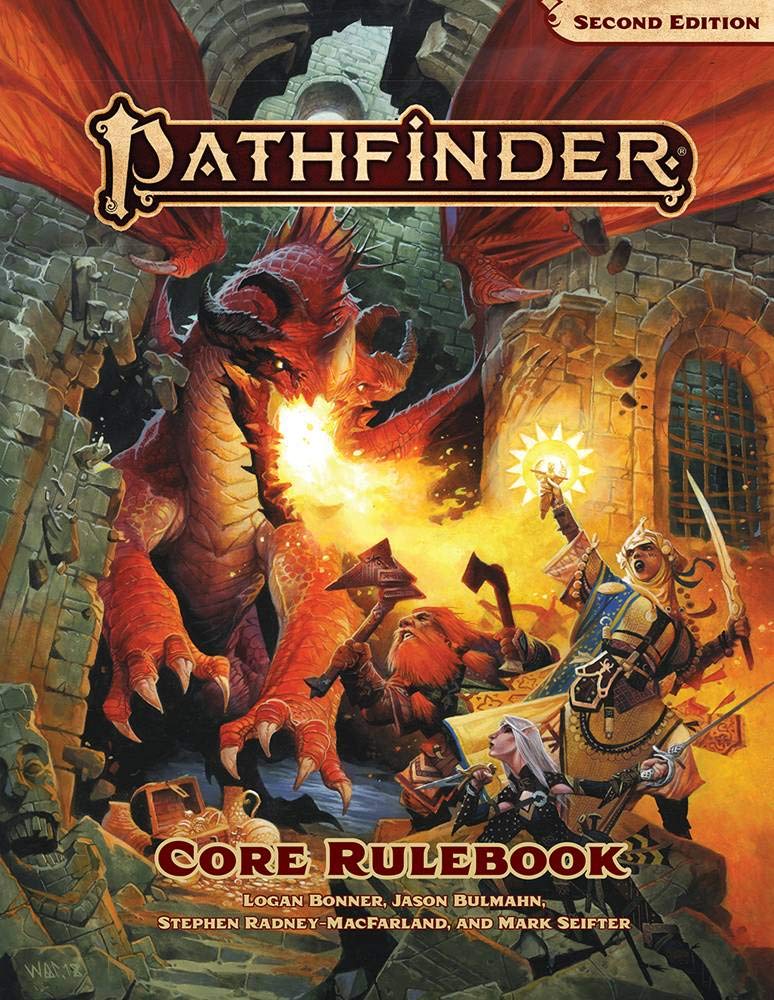
Learn More
Pathfinder Remaster: Beginning on November 15, 2023, no new characters may be created using the class chassis printed in the Core Rulebook if the class has been reprinted in the Player Core. This affects the following classes: bard, cleric, druid, fighter, ranger, rogue, witch, wizard.
Please be sure to visit the the Remaster Guidelines page of the Lorespire Wiki for further guidance on converting existing characters and adventures.
In addition to this sanctioning, please reference the Pathfinder Core Rulebook Errata for additional changes and clarifications to game rules.
Rarity and Access Adjustments
Please use these rarity and access adjustments in Society Play, instead of the rarity and access printed in the original source.
Languages: Note that the adjustment to regional languages (page 432) detailed in the Rulings and Clarifications section below expands some characters' access to Erutaki and Varki.
Items: All characters have access to the scholarly journal, scholarly journal compendium, survey map, and survey map atlas (page 291).
All characters have access to the wayfinder (page 617).Spells: All characters have access to raise dead (page 362).
Rituals: All characters have access to atone (page 409) and resurrect (page 415).
Option Availability
Standard
All options are of standard availability unless specifically noted otherwise.
Limited
General Feats: Connections (page 260).
Items:
- robe of eyes (page 615) - no longer functions with the removal of spell schools
Spells: dreaming potential (page 333; see below for more details)
Equipment: Hirelings (page 294); Pathfinder Society characters have access to more capable hirelings through the Achievement Points system.
Restricted
Deities
- Asmodeus (page 437)
- Rovagug (page 439)
- Urgathoa (page 439)
- Whispering Way (page 441)
Rulings and Clarifications
Please follow these rulings and clarifications specific to Pathfinder Society play wherever they conflict with the language printed in the original source.
- The level 1 version of summon plant or fungus (page 376) can be used to summon a leaf leshy (Pathfinder Bestiary page 218) that has the weak adjustment (Pathfinder Bestiary page 6). This is an exception to the rule that summon spells do not normally allow you to adjust the level of the summoned monsters by applying adjustments or templates to them.
- Add the following regional languages to the options listed on page 432. As with other regional languages, a character hailing from the region listed below automatically has access to these languages.
- Erutaki: Saga Lands
- Varki: Saga Lands
- Some creatures have abilities that only end or trigger when they are killed. In Organized Play, abilities that only end when a creature is killed end when a summoned version of the creature is banished. Abilities that trigger when a creature is killed do not trigger when banishing a summoned creature, including when a creature is reduced to 0 Hit Points and banished per the Summoned trait.
- [UPDATED MAR '24] Any deity that would grant the dreaming potential spell as a domain spell instead grants illusory scene (Player Core 337). Previously this spell was substituted with cloak of colors, but that spell was not moved to the Pathfinder Remaster.
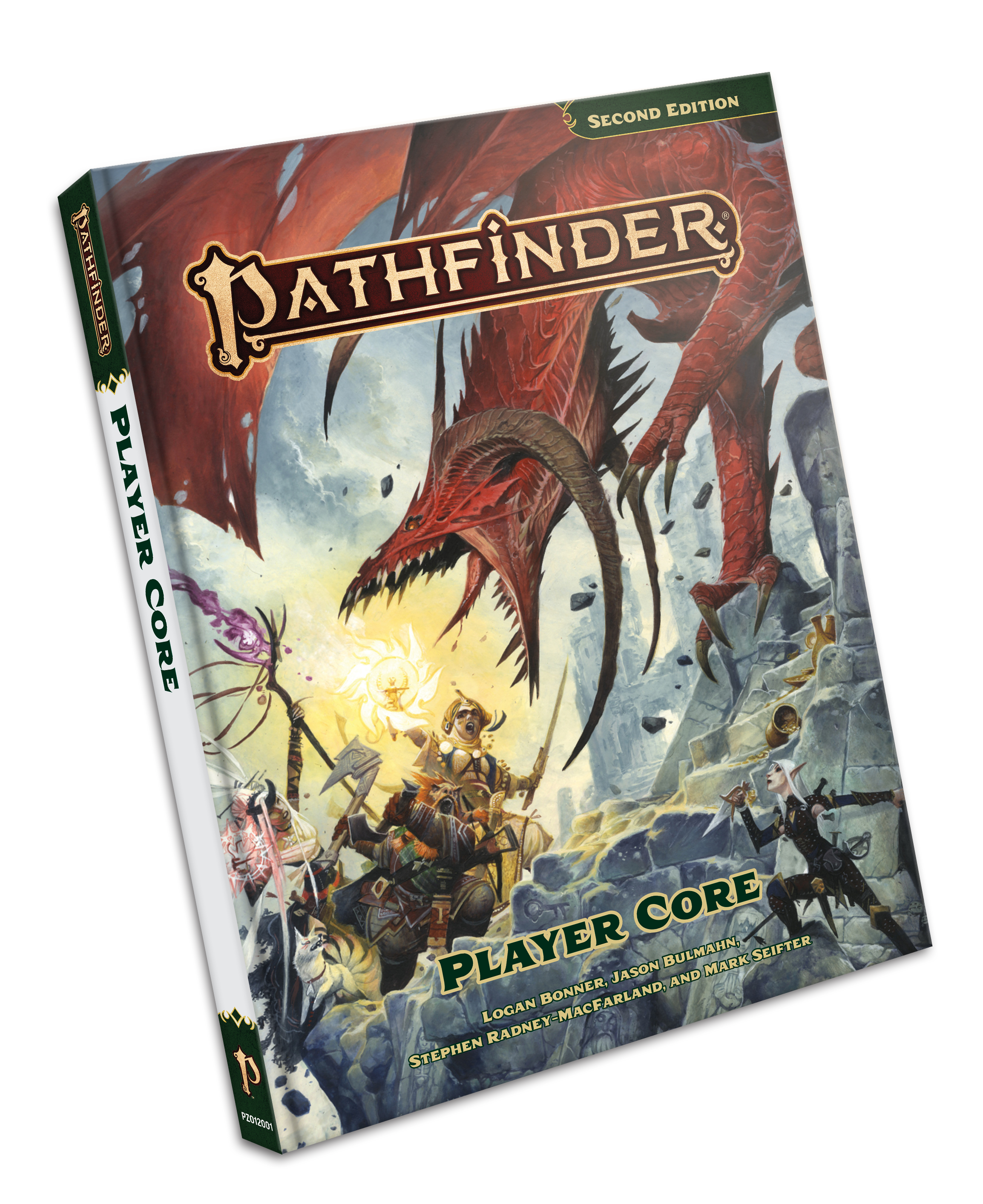
Buy Now
Please be sure to visit the Pathfinder Errata page for design team clarifications, which are not replicated here, as well as the Remaster Guidelines page of the Lorespire Wiki for further guidance on converting existing characters and adventures.
Rarity Adjustments
All Pathfinder agents have access to the following Uncommon options:
Ancestries and Heritages: changeling and nephilim versatile heritages (pages 76-79).
Items: katana, kukri, spiked chain and wakizashi (page 278); [NEW] scholarly journal, scholarly journal compendium, survey map and survey map atlas (page 292).
Spells: raise dead (page 352)
Standard
All options are of standard availability unless specifically noted otherwise.
Limited
Custom Mixed Heritages (page 82) - this requires too much GM overhead to make broadly accessible. The Organized Play team will look to create opportunities to create additional mixed heritages in the future.
Spells
dreaming potential (page 327) - does not interact well with the Downtime system used in PFS. Any deities which grant this spell now grant illusory scene at the same level.
umbral journey (page 364) - spell requires too much GM improvisation. Any deities which grant this spell now grant slither at the same level.
Restricted
Feats
Communal Crafting (253) - does not fit with Pathfinder Society’s downtime rules
Monster Crafting (258) - requires too much GM oversight
Deities
Asmodeus (page 35) - edict to “torture weaker beings” is unacceptable in PFS play
Rovagug (page 38) - edict to “destroy all things” is problematic in PFS play.
Urgathoa (page 38) - requires unholy sanctification.
Clarifications
Please be sure to visit the Pathfinder Errata page for design team clarifications, which are not replicated here, as well as the Remaster Guidelines page of the Lorespire Wiki for further guidance on converting existing characters and adventures.
General Rules Clarifications
- All characters in Pathfinder Society are Trained in their Class DC at first level.
- For the purposes of abilities like the mastermind rogue racket, a character is considered to have successfully identified a creature when they succeed or critically succeed at a Recall Knowledge check, regardless of what information they gain.
- The “aiuvarin” and “half-elf” traits are considered interchangeable; half-elf characters have access to aiuvarin options and vice versa. The same applies for dromaar and half-orc characters. The nephilim trait is interchangeable with either the aasimar or tiefling trait and vice versa, but aasimar characters may not treat that trait as interchangeable with the tiefling trait (or vice versa).
- Followers of deities whose sanctifications have not been published treat the sanctification as “may sanctify to holy” until the publication of official information.
- [UPDATED] The new guidelines for Recall Knowledge differ between Player Core and GM Core (specifically, the Creature Identification section in the GM Core is outdated). PFS GMs should use the rules for answering player questions as printed in Player Core.
- The Unique tag on a creature does not necessarily increase the DC to Recall Knowledge. Players can choose to roll against a standard DC for the creature’s level to learn general information about that creature or its creature family (such as learning what a particular dragon might be weak to, or what its breath weapon might be). They could also opt to roll against the increased Unique DC to learn specific information about a creature’s history or storied abilities (such as learning that Bob the Orc Warleader has defeated dozens of armies with his unique military strategy).
- Gaining the basic spellcasting feats from a spellcasting archetype counts as having a spellcasting class feature for the purpose of activating an item with a Cast a Spell activation.
- The new dragons featured in Monster Core are not yet available for draconic options such as sorcerer bloodlines, but can be used for the relevant spells such as dragon form using the table on page 327. Previously-published draconic options such as chromatic and metallic dragons remain legal for use.
- Some spells or abilities require NPCs to make saves whose statistics are not provided, such as casting ignite ambition on unstatted NPC contacts. In this instance, the GM should set the DC using the DC by Level table on page 53 of the Pathfinder GM Core and adjusting based on the situation.
- Creatures no longer care about spell schools. If a creature such as the roiling incant is used in a scenario, ignore any abilities that specifically activate when a specific spell school is used against it.
Class Feats and Abilities
- [NEW] Due to a quirk of the interaction between the remaster changes and the PFS-specific guidelines, change the second sentence of the bard's Martial Performance feat to read as follows: "When you have a courageous anthem or inspire courage composition cantrip active..." Add the following text to the feat: "You become trained with all martial weapons. If you gain the bard weapon expertise class feature, your proficiency rank with martial weapons increases to expert." This text is redundant for remastered bards, but restores Core Rulebook bards to full functionality.
- Additionally, any bard feat which specifically mentions courageous anthem (such as Courageous Assault) also functions in the same manner with inspire courage.
- The Plant Empathy druid feat (page 127) can be used to speak to any plant or fungus. However, GMs should remember that this feat does not alter a plant’s intelligence, and that everyday plants would therefore know very little about their surroundings.
- Change the effect of Primal Howl (page 133) to read “Your companion screeches and howls…”
- Add the following text to Sleek Reposition (page 143): “If you’re wielding a polearm, you can ignore Reposition’s requirement that you have a hand free.”
- Witch Familiars
- Familiars must have line of effect for their new abilities to affect creatures. As such, in order to use a familiar’s ability in combat, they must be represented by a token on the battlefield.
- As familiars are minions, they can still occupy the same space as a PC. However, if they are using their abilities in combat their location must be tracked, and they are subject to any damaging effects that include them (like an area of effect spell).
- If a witch’s patron is Baba Yaga, their familiar gains the Familiar of Freezing Rime ability (page 185). If a witch’s patron is the Mosquito Witch, their familiar gains the Familiar of Ongoing Misery ability (page 184). Should these patrons be reprinted in future products, their familiar abilities will be updated.
- The Ceremonial Knife feat (page 188) can be used once per day to create one wand.
- Crafting a witch’s broomstick into a flying broomstick must be done by the witch with the Witch’s Broom feat (page 190) themself, not another crafter.
- If a Wizard’s school contains Uncommon spells, they are granted access to those spells.
General Feats
- The Adopted Ancestry feat (page 252) can only be used to select common ancestries or ancestries which all Pathfinder agents have access to (such as kobolds). The Organized Play team will look to create additional boons to allow characters to be adopted by additional ancestries.
- The Break Curse feat (page 253) can be used once at the end of a scenario to remove a curse. Should it fail, the affected PC must use spellcasting services or a boon to remove the curse.
- The DC to Recognize an Uncommon or Rare spell (page 261) should be the normal DC +2 or +5 based on rarity and spell level.
Spells
- If a visual figment (page 331) occupies the entirety of a 5x5 cube, it can provide cover or concealment, but not both, for a medium or smaller creature. It does not block line of sight.
- The figure created by ghostly carrier (page 333) counts as a creature for any abilities that target creatures, such as Reactive Strike.
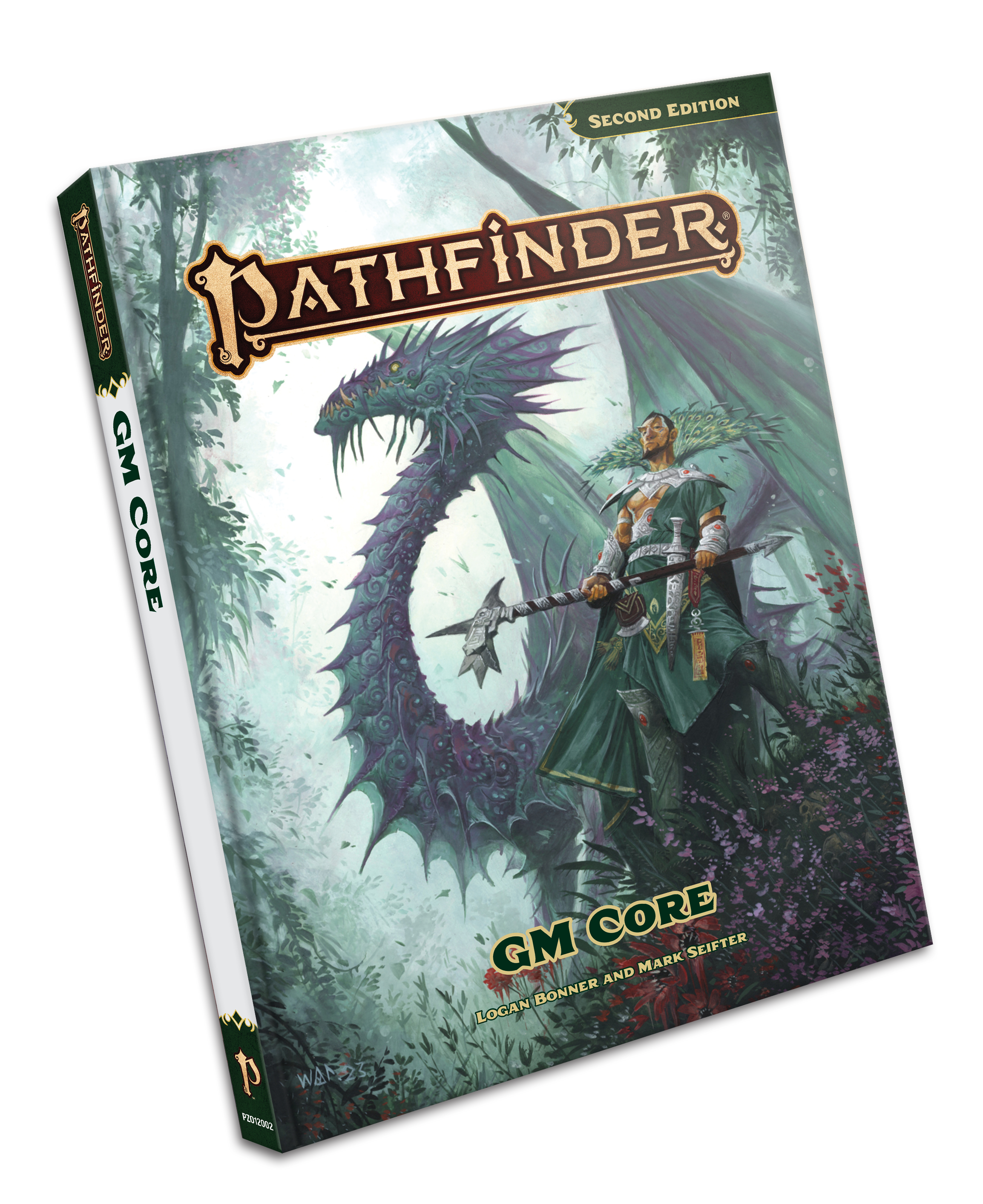
Buy Now
Please be sure to visit the Pathfinder Errata page for design team clarifications, which are not replicated here, as well as the Remaster Guidelines page of the Lorespire Wiki for further guidance on converting existing characters and adventures.
Rarity Adjustments
All Pathfinder agents have access to the following Uncommon options:
- staff of the unblinking eye (page 281)
Standard
All options are of standard availability unless specifically noted otherwise.
Safety Tools: As Pathfinder Society play involves a greater degree of strangers playing together than a typical ongoing campaign, GMs are encouraged to implement safety tools such as the X-Card at their tables.
Limited
All Vehicles (pages 213-217): PCs may not purchase vehicles; if a vehicle is necessary, it will be provided in the course of the adventure.
Restricted
Variant Rules: Pathfinder Society does not use the variant rules for Automatic Bonus Progression, Free Archetype, Level 0 Characters or Proficiency Without Level (pages 82-85).
Clarifications
- The chaplain’s cudgel (page 242) can only shift into one-handed melee weapons as per the shifting rune.
- After drinking a potion of emergency escape (page 259), the drinker is fleeing from all hostile creatures they are aware of.
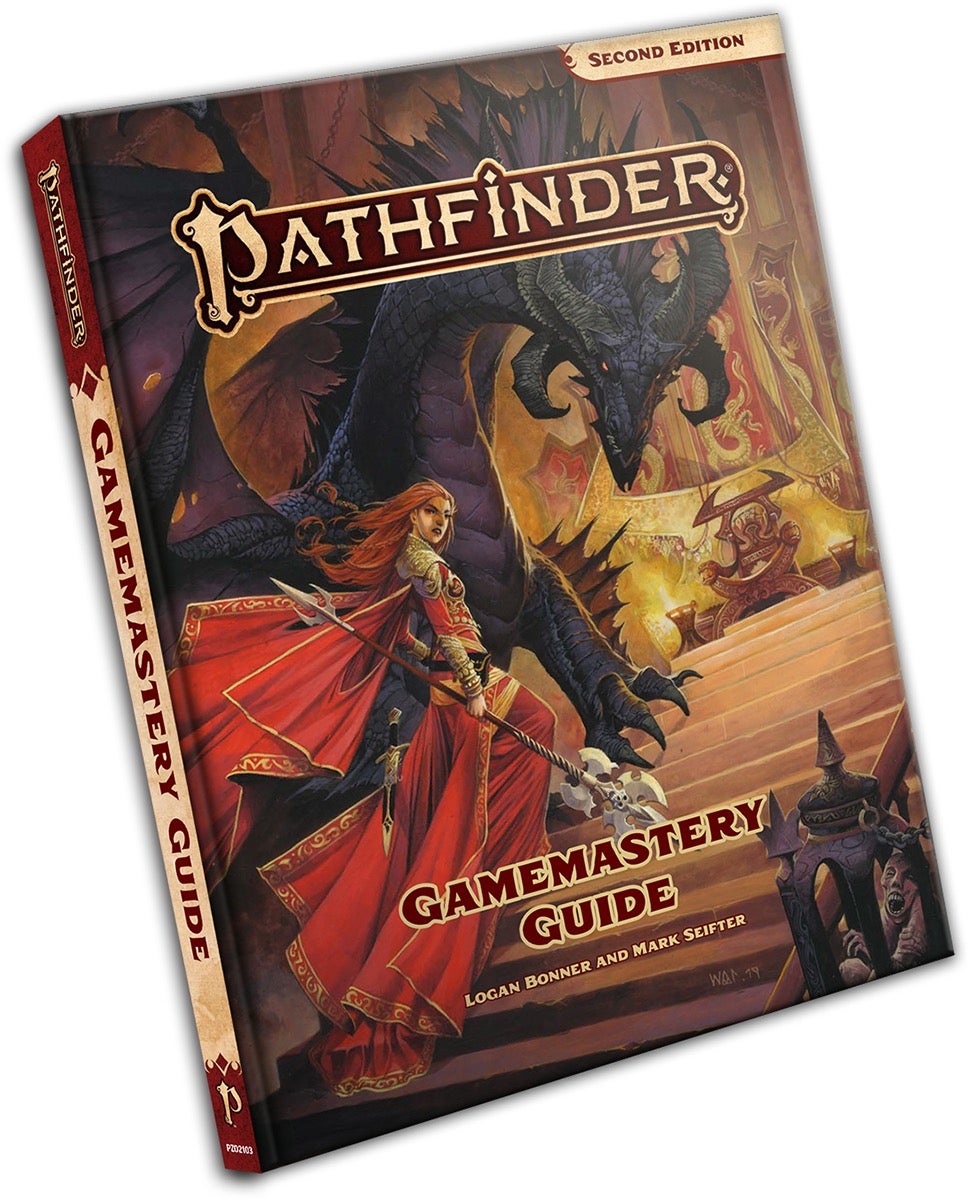
Learn More
As the Gamemastery Guide primarily contains tools for GMs, new subsystems, and rules variants rather than direct player options, all content from this book is of limited availability. However, Organized Play will be drawing from the rules options in this book in creating future adventures, boons, and other content.
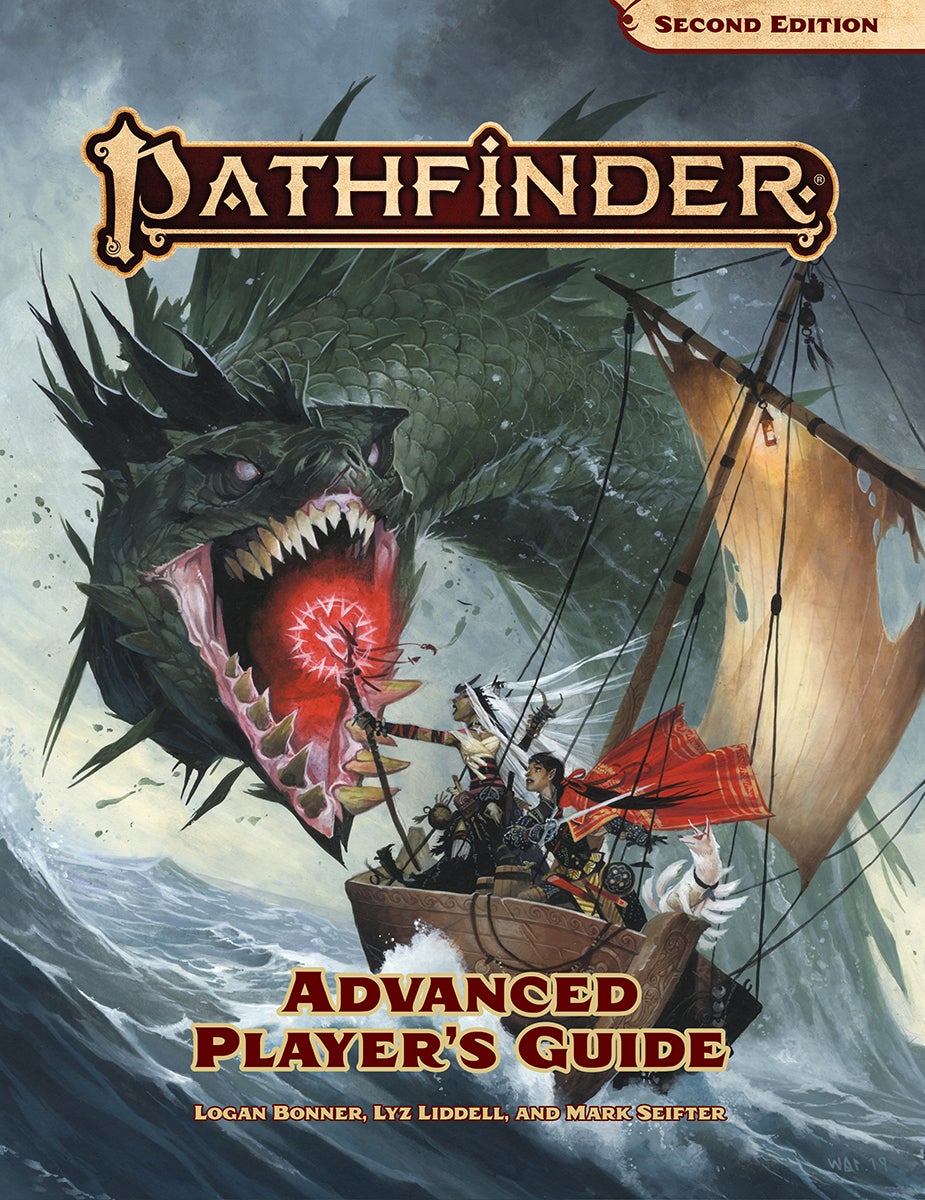
Learn More
Rarity and Access Adjustments
[UPDATED - August '23] Ancestries: Due to years of successful Pathfinder Society activities, all characters have access to the kobold ancestry (page 12), orc ancestry (page 17), ratfolk ancestry (page 20) and tengu ancestry (page 24), as well as the changeling versatile heritage (page 30), aasimar versatile heritage (page 35) and tiefling versatile heritage (page 39).
Archetypes: All characters have access to the vigilante archetype (page 196).
[NEW - Nov '22] Items: All characters have access to all levels of the oil of unlife (page 258).
Option Availability
Standard
All options are of standard availability unless specifically noted otherwise.
Ancestries: All ancestry and versatile heritage options, other than those mentioned above under Rarity and Access Adjustments, are of standard availability. As the catfolk ancestry and the dhampir and duskwalker versatile heritages are uncommon, this means they are limited to boon access through Chronicle Sheets or the Achievement Point system.
Limited
Items: earthsight box (page 260)
Feats: A Home in Every Port (page 202)
Biographical Eye (page 203)
Consult the Spirits (page 204)
Criminal Connections (page 204)
Underground Network (page 209)Restricted
Classes: Connect the Dots (page 62)
Whodunnit? (page 63)
Plot the Future (page 64)
Spells: ghostly tragedy (page 220)
Rulings and Clarifications
Please follow these rulings and clarifications specific to Pathfinder Society play wherever they conflict with the language printed in the original source.
- The snares created with the Snare Genius kobold ancestry feat (page 15) are temporary items and become unusable after 24 hours or during your next daily preparations, whichever comes first.
- The Tusks orc ancestry feat (page 18) requires the character to file down their tusks or perform a similar action to retrain; this is part of the normal retraining process and does not take any additional time.
- The temporary Hit Points granted by the Spell Devourer orc ancestry feat (page 19) are applied as soon as the character succeeds at their saving throw; for an effect that causes Hit Point damage on a successful save, such as a fireball, this means that the character gains the temporary Hit Points before taking damage.
- Unless specifically noted otherwise, most wands and scrolls are less than 1 foot long and can fit into a ratfolk’s Cheek Pouches (page 22).
- Per design team clarification, the Homeward Bound gnome feat (page 44) should be of uncommon rarity.
- Per design team clarification, the Speed penalty inflicted by the Kneecap feat (page 45) has a duration of 1 round.
- GMs should provide a character with the That’s Odd investigator feat (page 60) a hint whenever the character enters a room with hidden aspects, specifically with regard to hidden passageways (such as scuff marks near a bookcase that’s actually a swinging door), creatures or hazards (such as drippage on the floor from an unseen fungus growing on the rafters), or valuables (such as bunched carpet over a secret compartment in the floor that contains a bag of coins). The GM does not need to provide clues for rooms that have no significant secret or hidden features. These clues should indicate only that the character should investigate a given section of the room, not let them automatically uncover the hidden element or provide any additional information beyond signaling its presence.
- GMs should let a character with the Sense the Unseen investigator feat (page 64) know when the trigger for the ability has been met so they can use the feat if they so choose.
- Given the slightly relaxed rules around edicts and anathema in Society play, a barbarian with the superstition instinct (page 108) can benefit from spells and magic items if they are an unavoidable part of a Society adventure, such as if a scenario assumes the PCs are transported to their mission location via a teleport spell, or if an adventure requires that all PCs participate in a magical ritual.
- Per design team clarification, when a barbarian uses the Sunder Spell feat (page 111) against a spell like wall of fire that does not have a listed AC, the Strike hits automatically—the barbarian simply rolls the counteract check.
- [NEW - May '23] The Magic Arrow feat (page 173) allows that character to choose any magical ammunition they have access to, not just the common ammunition from this book and the Core Rulebook.
- A cavalier (page 184) can pledge to a legal deity, religion, or pantheon, an organization they have access to, or the Pathfinder Society. The edicts and anathema of the Pathfinder Society are as follows:
Edicts: Explore important sites, report and record your discoveries, and cooperate with fellow Pathfinders
Anathema: Fail to explore, report and cooperate; defy the will of a venture-captain or the Decemvirate - A vigilante’s Safe House (page 196), can be located in any city or near any lodge they have received a Pathfinder briefing. A vigilante can use their downtime to relocate their safe house. A vigilante can use their safe house only if it is in the town or location where their current adventure is taking place.
- The DCs for the Armor Assist feat (page 203) are not subject to GM adjudication. Rather, simply use the default DCs listed in the feat: 15 for common armor, 20 for uncommon armor, and 25 for rare armor.
- For the purposes of Society play, the Targets entry for the claim undead (page 230) oracle revelation spell is “1 mindless undead creature”, not “1 undead creature.” The intent of this change is to reduce the prevalence of domination magic on sapient creatures in Society play.
- Strikes made by a malicious shadow (page 238) use the spellcaster’s spell attack roll.
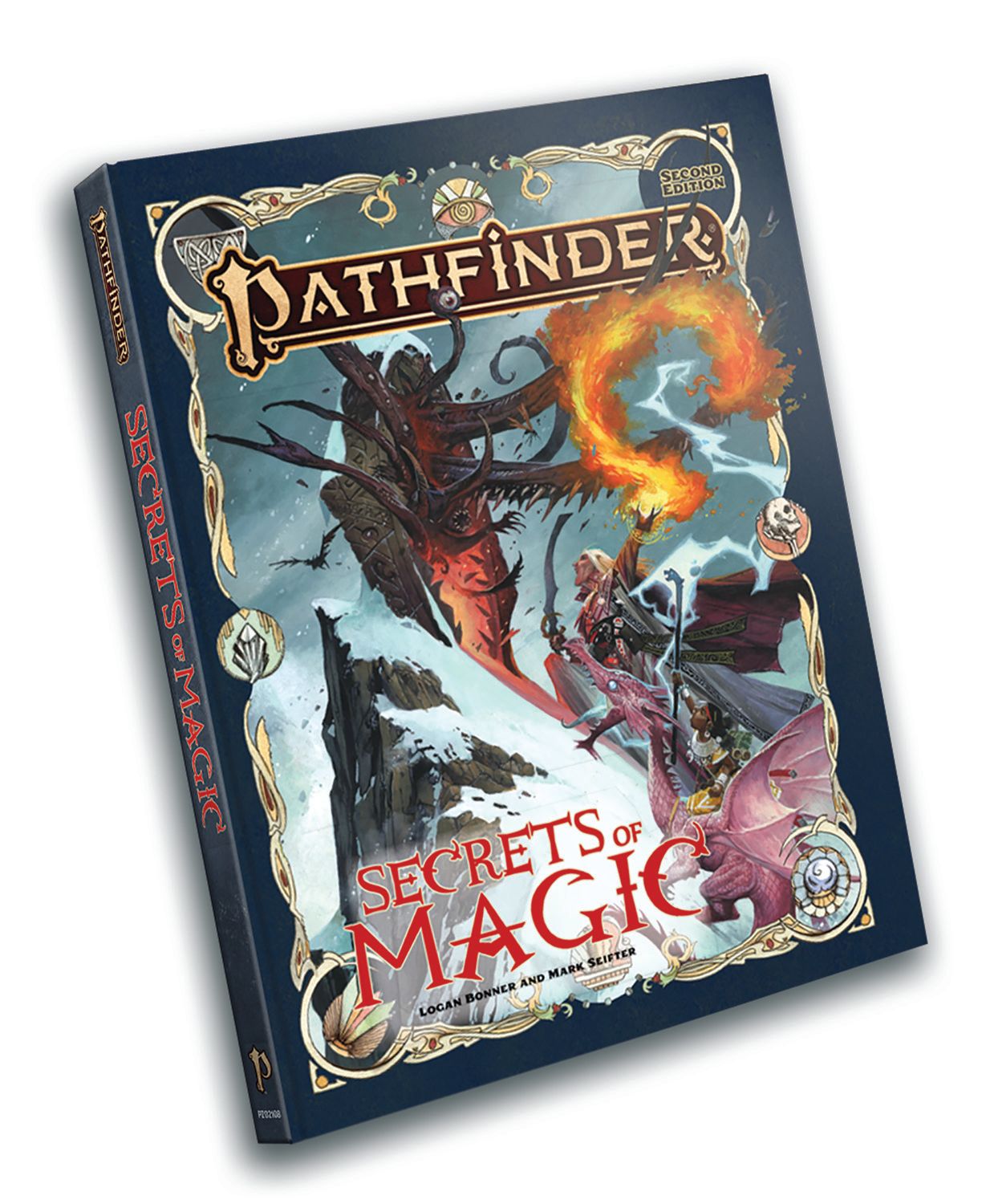
Learn More
Please be sure to visit the Pathfinder Errata page for design team clarifications, which are not replicated here.
Option Availability
Standard
All options are of standard availability unless specifically noted otherwise.
Limited
Spells
bandit’s doom (page 90)
glimmer of charm (page 108)
inner radiance torrent (page 112)
nullify (page 118)
shift blame (page 129)
sudden recollection (page 130)
All Rituals (pages 147-153)
Items
- ghostbane fulu (page 160)
- [NEW] codex of unimpeded sight (page 162) - no longer functions with removal of spell schools
- [NEW] instructions for lasting agony (page 163) - no longer functions with removal of spell schools
- [NEW] spellbook of redundant enchantment (page 163) - no longer functions with removal of spell schools
- [NEW] warding tablets (page 163) - no longer functions with removal of spell schools
- [NEW] rune of sin (page 165) - no longer functions with removal of spell schools
- ghostly portal paint (page 173)
- [NEW] potion of stable form (page 175) - no longer functions with removal of spell schools
- [NEW] auspicious scepter (page 179) - no longer functions with removal of spell schools
- [NEW] chatterer of follies (page 181) - no longer functions with removal of spell schools
- [NEW] guiding star (page 185) - no longer functions with removal of spell schools
- [NEW] specialist's ring (page 190) - no longer functions with removal of spell schools
Archetypes
Cathartic Mage (page 194)
Soulforger (page 236)
Wellspring Mage (page 248)
Other Rules
Pathfinder Society does not use the rules for Cathartic Magic (page 194), Ley Lines (page 214), Pervasive Magic (pages 218-223), Soul Seeds (page 230), or True Names (page 244). Any associated character options should be considered Limited.
Restricted
Eidolons
Demon eidolons (page 62) and any evil eidolons
Rulings and Clarifications
Please follow these rulings and clarifications specific to Pathfinder Society play wherever they conflict with the language printed in the original source.
Backgrounds: The lore chosen from the Eidolon Contact background can only be associated with a specific creature or category of creatures, not a broad creature type.
Eidolons: Eidolons are not PCs, so they do not count as PCs for effects that scale based on the number of PCs or players.
Eidolons and summoners share a pool of actions. As a result, for Victory Point/success counting systems that allow each PC a limited number of chances to roll, either the summoner or the eidolon can attempt each check. The summoner's player chooses for each attempt which of the two rolls. Any direct consequences of failure apply to whichever creature rolled the check.
This rule does not mean that in general only one of the summoner or eidolon need to roll to deal with adverse situations. If everyone in a room needs to attempt a saving throw against a hazard, both the eidolon and the summoner need to attempt that saving throw. If every PC needs to overcome a particular obstacle in order to continue (such as crossing a chasm), the eidolon and summoner both need to get past the obstacle.
Classes: A magus with the Laughing Shadow hybrid study replaces shift blame with time jump as their 11th level Studious Spell.
Class Feats: Using the Phase Out summoner ability (page 70) means that your eidolon cannot make any Strikes, nor can it take any actions requiring a physical form.
Items
- Fulus do not expire after one year. Players cannot create their own fulus or personal staves.
- A basic retrieval prism must be attuned to a PC to function.
- The holy water generated by an anointed waterskin does not persist beyond the end of a session and has an effective sale price of 0 gp.
- [NEW] Remove the word "evocation" from the book of lingering blaze (page 162).
- [NEW] Remove the word "conjuration" from the summoning handscroll (page 163).
- [NEW] Remove the word "necromancy" from the grim sandglass (page 171).
Spells: The summon lesser servitor spell cannot be used to summon imps.
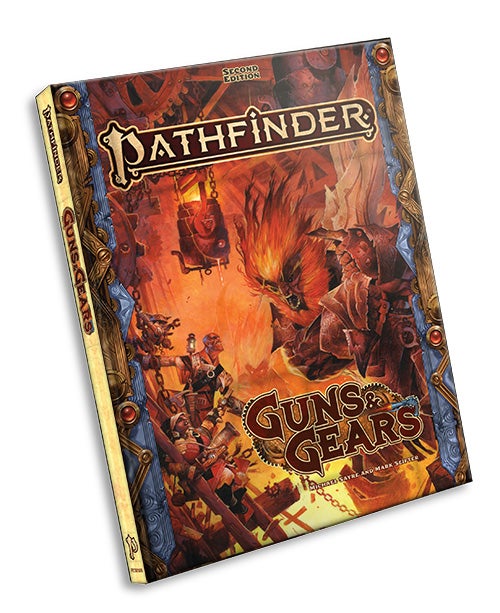
Buy Now
Rarity and Access Adjustments
- All Pathfinder Society agents have access to the Gunslinger and Inventor classes and archetypes.
- Inventors (and characters with the Inventor archetype) gain access to uncommon clockwork items and gadgets from Chapters 1 and 2 of this book, unless the item specifically states otherwise.
- Gunslingers (and characters with the Gunslinger archetype) gain access to all uncommon weapons, ammunition, and related items from Chapter 4 of this book, with the exception of Beast Guns and any limited or restricted items below, unless the item indicates otherwise.
- As stated on page 148 of Guns & Gears, feats that grant access to weapons with ancestry traits (such as Dwarven Weapon Familiarity), do not grant access to firearms with the listed trait unless the character separately has access to firearms. The reverse is also true, that general access to firearms does not grant access to ancestry-specific weapons. If you have access to firearms, you can gain access to firearms with an ancestry trait (dwarf, elf, goblin, etc.) by selecting an ancestry feat or other option that specifically grants it (for example, to gain access to a clan pistol, take the Clan Pistol feat or Dwarven Weapon Familiarity feat).
- Characters with a Home Region of Absalom, New Thassilon, or Arcadia have access to uncommon clockwork items from Chapters 1 and 2, as inventors.
- Characters with a Home Region of Alkenstar, Dongun Hold, or the Shackles have access to all black powder guns, ammunition and related accessories; and all archetypes from Chapter 3 with the exception of beast gunner, fireworks technician, and spellshot. Characters from Alkenstar or Dongun Hold also have access to uncommon clockwork items from Chapters 1 and 2, as inventors.
- Characters with a Home Region of Tian Xia or Vudra have access to hand cannons and fire lances, associated ammunition and accessories; and the fireworks technician archetype.
- Characters with a Home Region of Arcadia have access to air guns, beast guns, non-black powder ammunition and accessories; and all archetypes from Chapter 3 with the exception of fireworks technician and demolitionist.
- Players who own a copy of the Goblin Fireworks Fight board game gain access to the fireworks technician archetype for all their characters. A copy of the game’s instruction booklet is sufficient to prove ownership.
- Characters with access to a firearm also automatically are granted access to the firearm cleaning kit and basic ammunition for that weapon, if necessary (e.g. characters with access to a flintlock pistol also have access to firearm ammunition).
Standard
All options are of standard availability unless specifically noted otherwise.
Limited
Archetypes
Artillerist (page 128)
Items
chameleon suit (page 67)
magnetic suit (page 71)
clockwork bookshelf (page 85)
clockwork box packer (page 85)
gunner’s saddle (page 182)
Other Rules
[UPDATED] Players may not use the rules on page 162 for integrated firearms, or on page 171 for Feather Token Ammunition. Players are not subject to the rules on page 203 for mechanical errors.
Restricted
Archetypes
Demolitionist (page 133)
Feats
Axial Recall (Automaton; page 43)
Items
All siege weapons and vehicles are restricted, due to their unsuitability for the constraints of Organized Play.
Clarifications
Please follow these rulings and clarifications specific to Pathfinder Society play wherever they conflict with the language printed in the original source.
- For the automaton’s Rain of Bolts feat, the DC is the higher of your class DC or spell DC.
- For the purpose of gunslinger feats and abilities, if the ability states that you fire your weapon, you fire your weapon; if it does not state as such, you do not have to fire your weapon. Notably, Fake Out does not require you to actually fire your weapon.
- For the gunslinger’s Alchemical Shot feat and any similar abilities that change a weapon’s damage type, only the primary damage’s type is affected; any secondary effects (such as precision damage or damage applied from a rune) are not affected.
- For the gunslinger’s Dance of Fire feat, the first set of three actions must be resolved before subsequent sets of actions can be taken.
- Characters with the Sniping Duo archetype may choose their sniping partner at the beginning of the scenario without spending Downtime to retrain the option.
- The clan pistol’s ammunition costs 1 sp for 10 rounds.
- The glitterdust spell cast by the fairy bullet has a DC of 23 (as is standard for a 7th-level item).
- Weapons that install an air cartridge firing system and that have the kickback trait retain the trait and the associated drawbacks.
- [NEW - Nov '23] Replace the word "transmutation" in the scope of truth (page 182) with the word "polymorph."
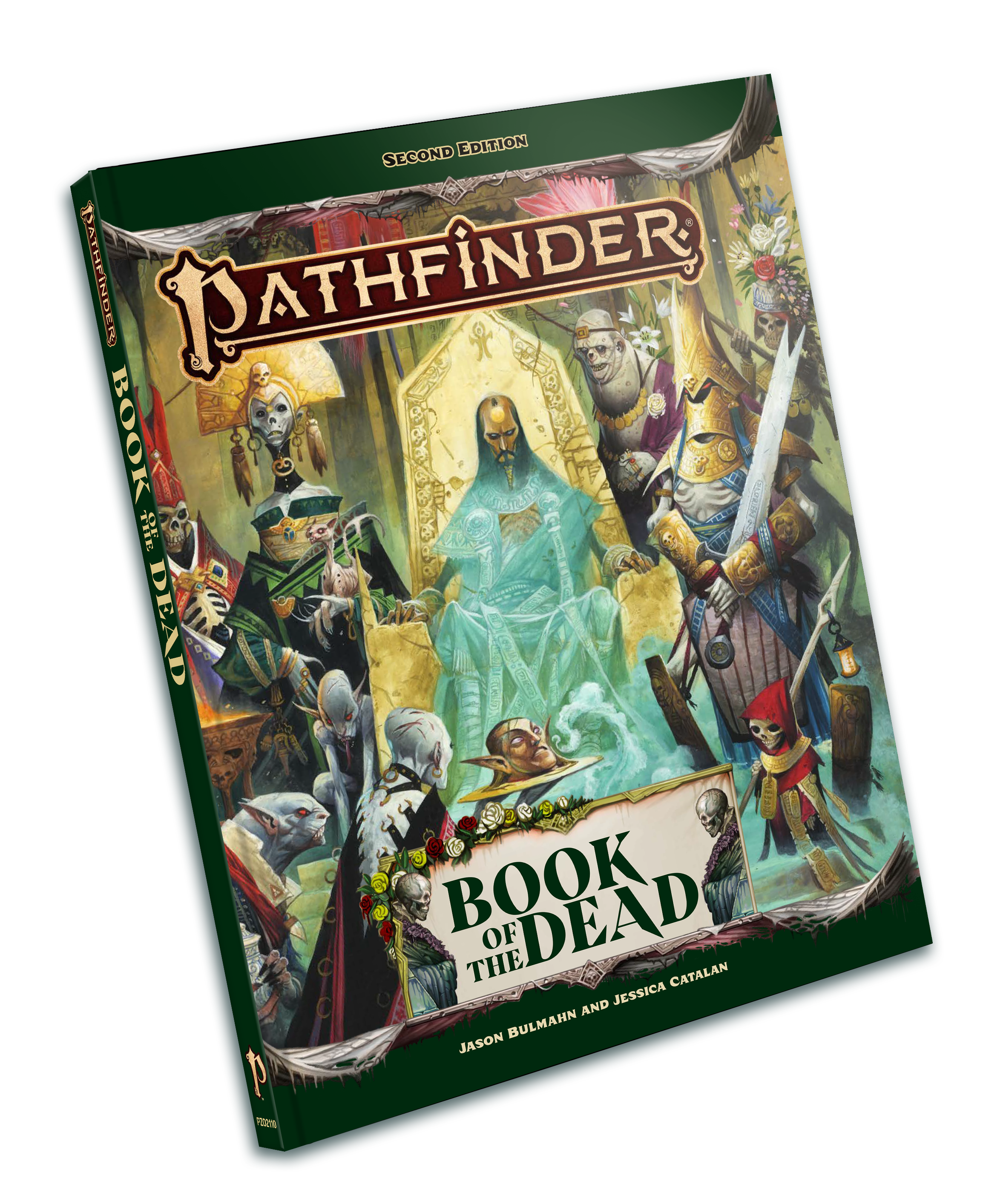
Buy Now
Standard
All options are of standard availability unless specifically noted otherwise.
Limited
Archetypes
Reanimator (page 34)
Familiars
Polong (page 40)
Restricted
Archetypes
Undead Master (page 41)
Creatures
Geist (page 96)
Sykever (page 83)
Tormented (page 152)
Urveth (page 84)
Vanyver (page 82)
Deities
All evil deities (Charon, Orcus, Zura [page 43]; Kabriri [page 105]; Set [page 133])
Other Rules
- While the Deathless Acolyte of Urgathoa can be used for the purpose of summoning spells and similar, the rules for Deathless Deity Adjustments on page 89 may not be used in Organized Play.
- The rules for Starting Out as Undead and Becoming Undead (page 45) are not used in Organized Play.
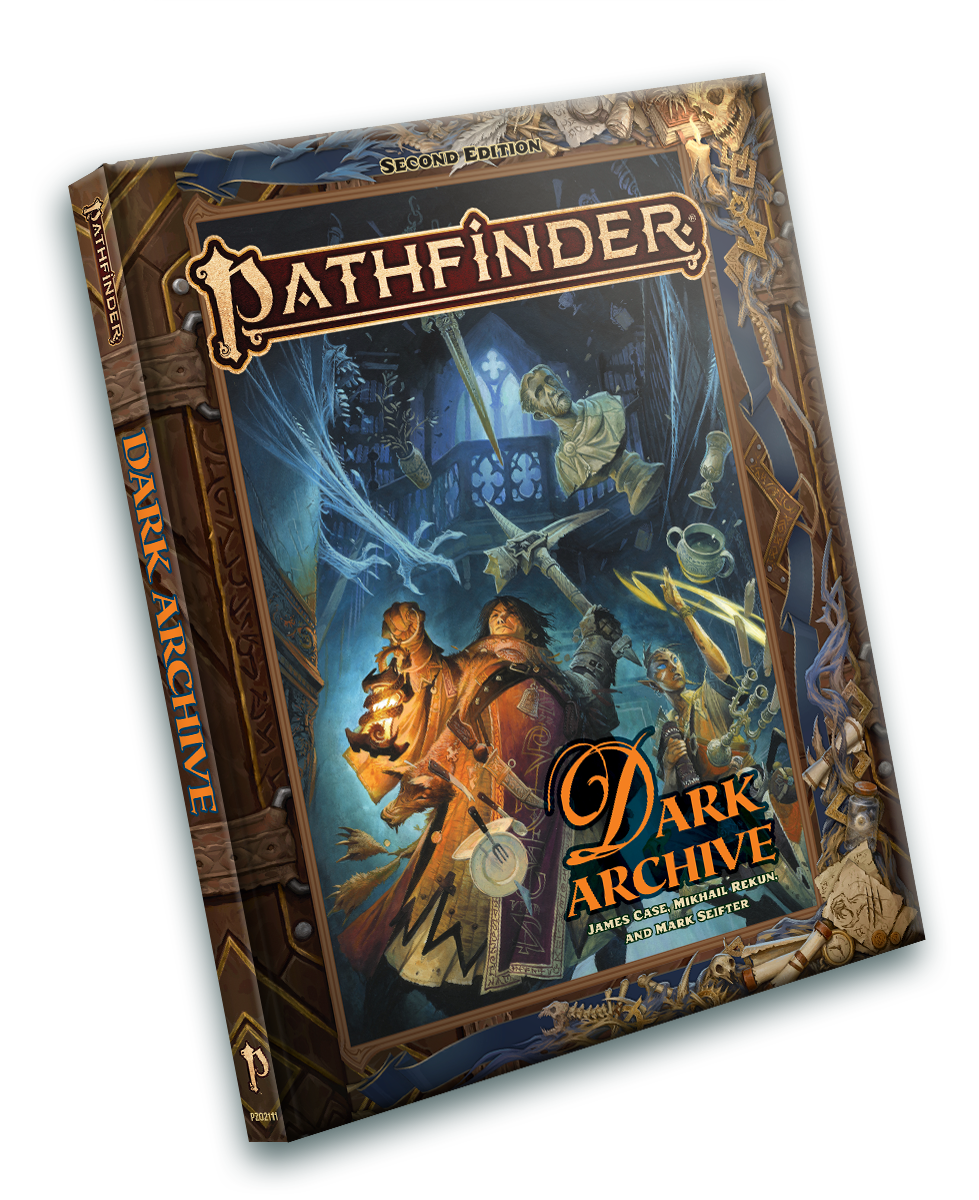
Buy Now
A reminder that in keeping with the “Explore, Report, Cooperate” motto of the Pathfinder Society, engaging in non-consensual character-versus-character conflict is prohibited. While accidental friendly fire happens due to missed attack rolls or other factors, players must obtain the consent of other players before taking an action that would include another PC in a damaging effect or other or harmful effect (such as effects that impose negative conditions).
Some examples include casting a harmful spell on another PC or an area that includes them, throwing a splash weapon that would deal splash damage to another PC, or moving closer to another PC while surrounded by a harmful emanation in a way that exposes them to its effects.
This rule does not apply in situations where a character is not acting of their own free will, such as if they’re being mind-controlled by an NPC and forced to attack a fellow Pathfinder.
Standard
All options are of standard availability unless specifically noted otherwise.
Limited
Feats
All Aftermath Feats (pages 55–57)
All Deviant Abilities (pages 98–103)
Spells
All Apocryphal Spells (pages 142–144)
Restricted
Archetypes
Living Vessel Archetype and all associated feats (page 140)
Sleepwalker and all associated feats (page 206)
Feats
Shatter Space (page 28)
Items
chaos collar (page 62)
Horn of the Aoyin (page 115)
All cursed items (pages 160–161)
Rituals
All Rituals (pages 145–147; page 199)
Rules
Secret Society Membership Services (page 84)
Spells
time pocket (page 183)
Clarifications
- Characters with the Reflection versatile heritage may not be a Reflection of any known and named NPC in Pathfinder canon. Your appearance may be used to strengthen your character’s story and roleplay, but cannot be used to impact gameplay during Organized Play adventures.
- Per design clarification, change the third sentence of the psychic’s Conservation of Energy ability to read “The first time in an encounter that you cast a granted spell from your conscious mind or a standard psi cantrip[...]” The intent is for Conservation of Energy to apply to produce flame and ray of frost, but not the unique cantrips, which are designed to function as written.
- [NEW Feb '24] The DC of the Curse Maelstrom's Expel Maelstrom is the higher of the character's spell DC or class DC.
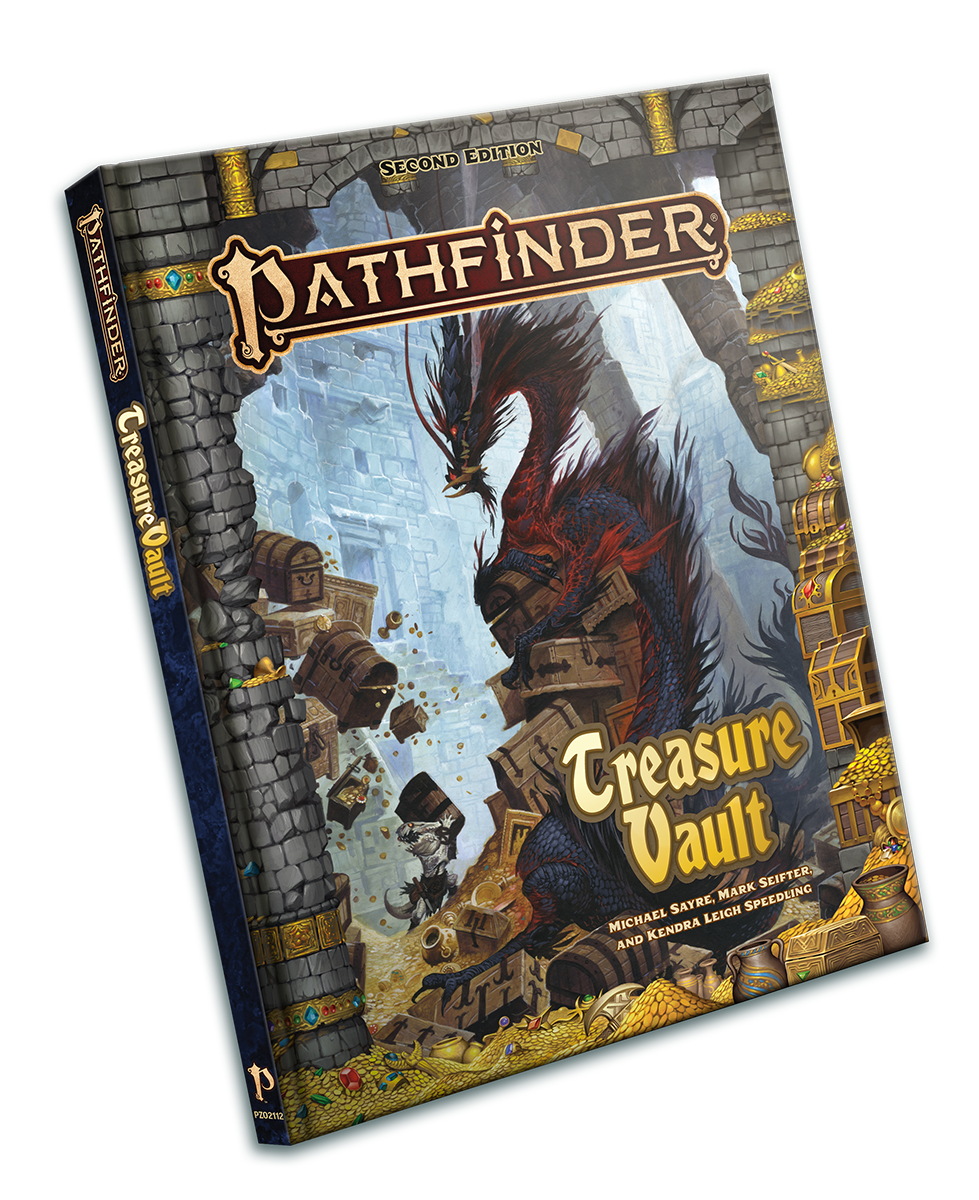
Buy Now
Many uncommon items can be unlocked by purchasing the Avid Collector - Treasure Vault boons from the Boon Store. Check the Pathfinder Society FAQ page for a list of what is included in each boon.
Access Adjustments
Characters from Numeria have access to the polytool (page 27).
Standard
All options are of standard availability unless specifically noted otherwise.
Limited
Beast Armaments
vine whip (page 38)
Alchemical Ammunition
ooze ammunition (page 43)
rusting ammunition (page 43)
Alchemical Food
[NEW] warding punch (page 51) - no longer functions with the removal of spell schools
Alchemical Tool
gearbinder oil (page 54)
Armor Property Rune
[NEW] spellbreaking (page 13) - no longer functions with the removal of spell schools
Apex Item
[NEW] whispering staff (page 105) - no longer functions with the removal of spell schools
Grimoire
[NEW] Codex of Destruction and Renewal (page 111) - no longer functions with the removal of spell schools
[NEW] courtier's pillow book (page 112) - no longer functions with the removal of spell schools
[NEW] Harrow spellcards (page 112) - no longer functions with the removal of spell schools
[NEW] undertaker's manifest (page 113) - no longer functions with the removal of spell schools
Staff
spellstrike staff (page 134)
Wand
wand of fey flames (page 360)
Worn Item
vaultbreaker’s harness (page 145)
cassisian helmet (page 151)
ring of discretion (page 154)
mask of the cursed eye (page 155) - no longer functions with the removal of spell schools
Restricted
Armor
Reef Heart (page 18)
Weapon Rune
Pacifying (page 33)
Poison
clown monarch (page 68)
mustard powder (page 70)
Potions
empath’s cordial (page 89)
Wondrous Consumable
wind ocarina (page 99)
Grimoire
courtier’s pillow book (page 112)
Magical Tattoo
boozy bottle (page 119)
Staff
socialite staff (page 134)
Wand
wand of choking mist (page 138)
Other Items
All Artifacts (pages 178-185)
All Blighted Boons (187-189)
All Cursed Items (190-193)
All Intelligent Items (193-197)
Alternate Rules
The Complex Crafting, Critical Crafting, Nature Crafting and Story-Based Crafting rules (pages 148-168) are not used in the Pathfinder Society campaign. The Quick Setup feat is also not permitted in Pathfinder Society play.
Rulings and Clarifications
- Attacks made by armor with the swallow-spike rune (page 13) apply the Multiple Attack Penalty as if you had made them with another weapon.
- [NEW] Per rules & lore team clarification, the leiomano as printed on page 27 should replace the version initially printed in a previous Adventure Path.
- Per clarification from the Rules & Lore team, the grounding spike and polarizing mace (page 34) should both be 10th level items and cost 950 gp each. The dragontooth club (page 36) should be 13th level and cost 3,000 gp.
- The version of the alicorn lance (page 36) which does evil damage may not be purchased or crafted in Pathfinder Society play.
- The clause of sight-theft grit (page 70) which states that “the blinded condition from this poison lasts for an additional 24 hours once the poison has run its course” only applies if the target reaches Stage 3 and is blinded.
- Items which can be used once per week, such as the architect’s pattern book (page 110) may be used once per scenario or adventure in Pathfinder Society play.
- [NEW] Remove the word "conjuration" from the illuminated folio (page 112)
- Items with effects that have an undetermined duration, such as the linguist’s dictionary (page 112), end their effects at the end of a scenario or adventure unless specifically stated otherwise by the campaign rules.
- [NEW] Remove the word "enchantment" from the desolation locket (page 125).
- [NEW] Remove the word "necromancy" from the ghostcaller's planchette (page 125).
- [NEW] Remove the word "abjuration" from the radiant prism (page 127).
- [NEW] Remove the word "necromancy" from the sanguine fang (page 128).
- [NEW] Remove the word "conjuration" from the wyrm claw (page 129).
- The counteract check from a pair of clarity goggles uses the item’s level to determine the degree of success.
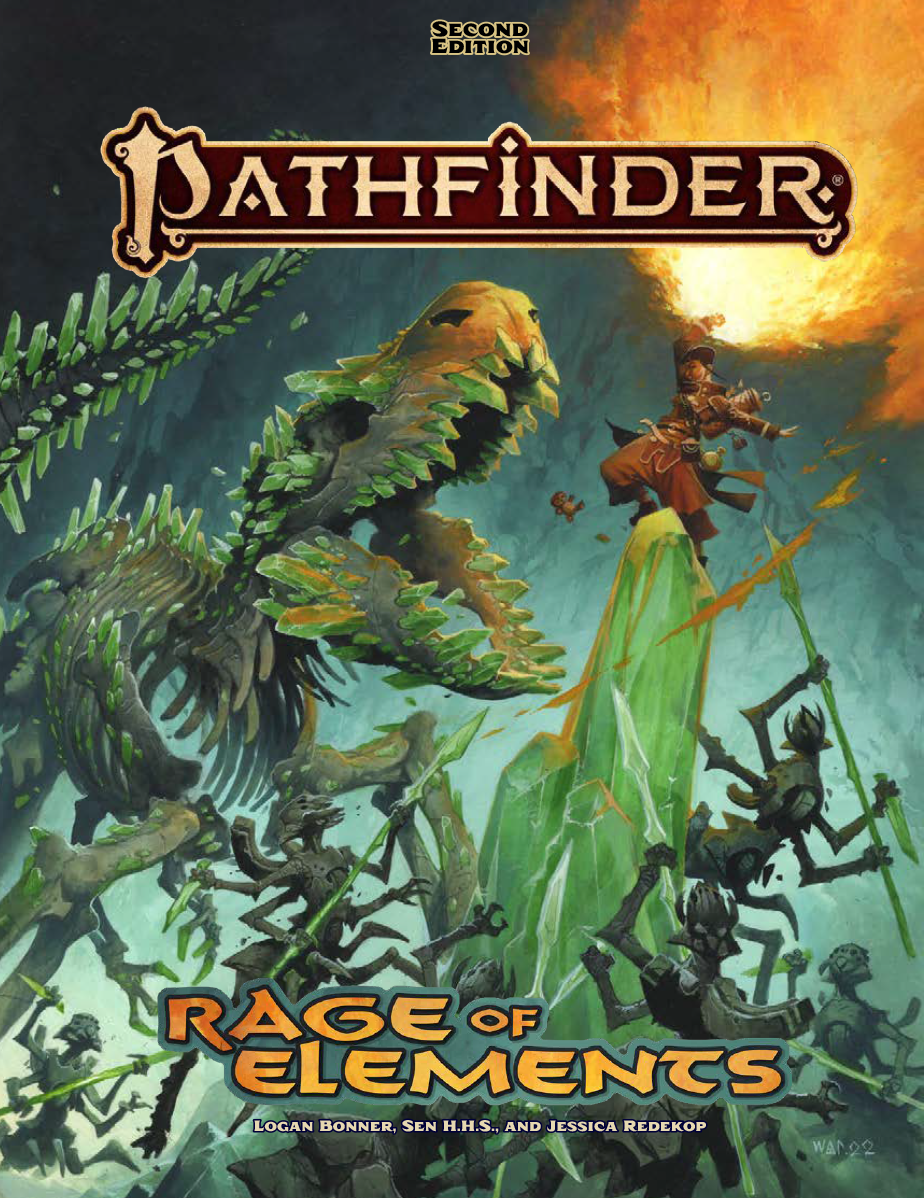
Buy Now
Core Preview
Options from the Pathfinder Remaster Core Preview document are only available for use if an option in Rage of Elements specifically permits it. Players and GMs are encouraged to use the Core Preview to begin familiarizing themselves with the new and updated game terms coming with the full release in November.
Standard
All options are of standard availability unless specifically noted otherwise.
Limited
Spells
fire’s pathway (page 119) - teleport spell.
heatvision (page 120) - too subject to GM discretion.
Items
submersible anglerfish lantern (page 176) - can create a vehicle, which are not used in Pathfinder Society. The basic anglerfish lantern is permitted as normal.
planar skiff (page 225) - vehicles are not used in Pathfinder Society.
Restricted
Deities
Ayrzul (page 92) - edicts to poison everyone and always lie are disruptive at the table.
Ferrumnestra (page 140) - anathema to preserving knowledge is directly opposed to the Pathfinder Society’s goals.
Hshurha (page 68) - edict of “humiliate terrestrial creatures” is disruptive at the table.
Kelizandri (page 126) - edict to create phobias in others.
Rituals
All rituals (pages 73, 175, 223) - rituals are not used in Organized Play.
Spells
mantle of the melting heart (page 143) - spell can grant immunity to poison and automatic item damage that bypasses hardness, which are both extremely potent
Other Rules
Relic gifts (page 148) - Relics are not used in Organized Play.
Rulings and Clarifications
Feats
- The elemental summoned by the Fearsome Familiar feat (page 22) should be given the Summoned trait in addition to its other traits.
Impulses
- Movement caused by the Flinging Updraft impulse (page 24) is forced movement.
- Add the following text to the Ghosts in the Storm impulse (page 25) for Pathfinder Society play: “If the Strike is magical and already has the maximum number of property runes, the wielder can choose one to suppress to gain shock.”
- Each 5-foot cube of stone created by the Igneogenesis impulse (page 26) has the same statistics as stone (7 Hardness, 28 HP, BT 14).
- When a kineticist and their Crawling Fire (page 28) are both caught in the area of an effect, only one save must be made and damage is only applied once.
- A Tree of Duality (page 37) creates both the Cleansing Pollen and Hallucinogenic Spore effects, not just one.
- For Pathfinder Society play, any druid with an animal companion may take a metal elemental as their companion (pages 39-42). Druids of the specifically listed orders may also take the other elementals (e.g. a wave order druid may take a water elemental companion).
Items
- The Fortitude save for Jaathoom’s Rebuke (jaathoom’s scarf, page 75) is 28, not 18.
- The cymophane cabochon aeon stone (page 98) only provides its item bonus to Perception checks and DCs against Hide, Sneak and Steal actions, not a universal bonus to Perception checks and DCs. Similarly, the polished pebble aeon stone (page 98) only grants its item bonus to Fortitude saves and DCs against attempts to grapple or swallow the holder; it does not provide a universal bonus to Fortitude saves.
- When using a broadleaf shield (page 200), the season is the current season where the player is located.
Spells
- [UPDATED] Any spells which require metal to function (such as needle darts [page 144]) require the PC to be in possession of at least one chunk of that metal or an item made of that metal.
- For the purposes of the fold metal spell (page 143) in Pathfinder Society play, objects which are part of a structure (such as a door, or a lock on a window) are not considered “unattended.”
- Movement caused by the magnetic dominion spell (page 143) is forced movement.
- Remove the range from the elemental breath spell (page 222). The cone is created from the user’s square.
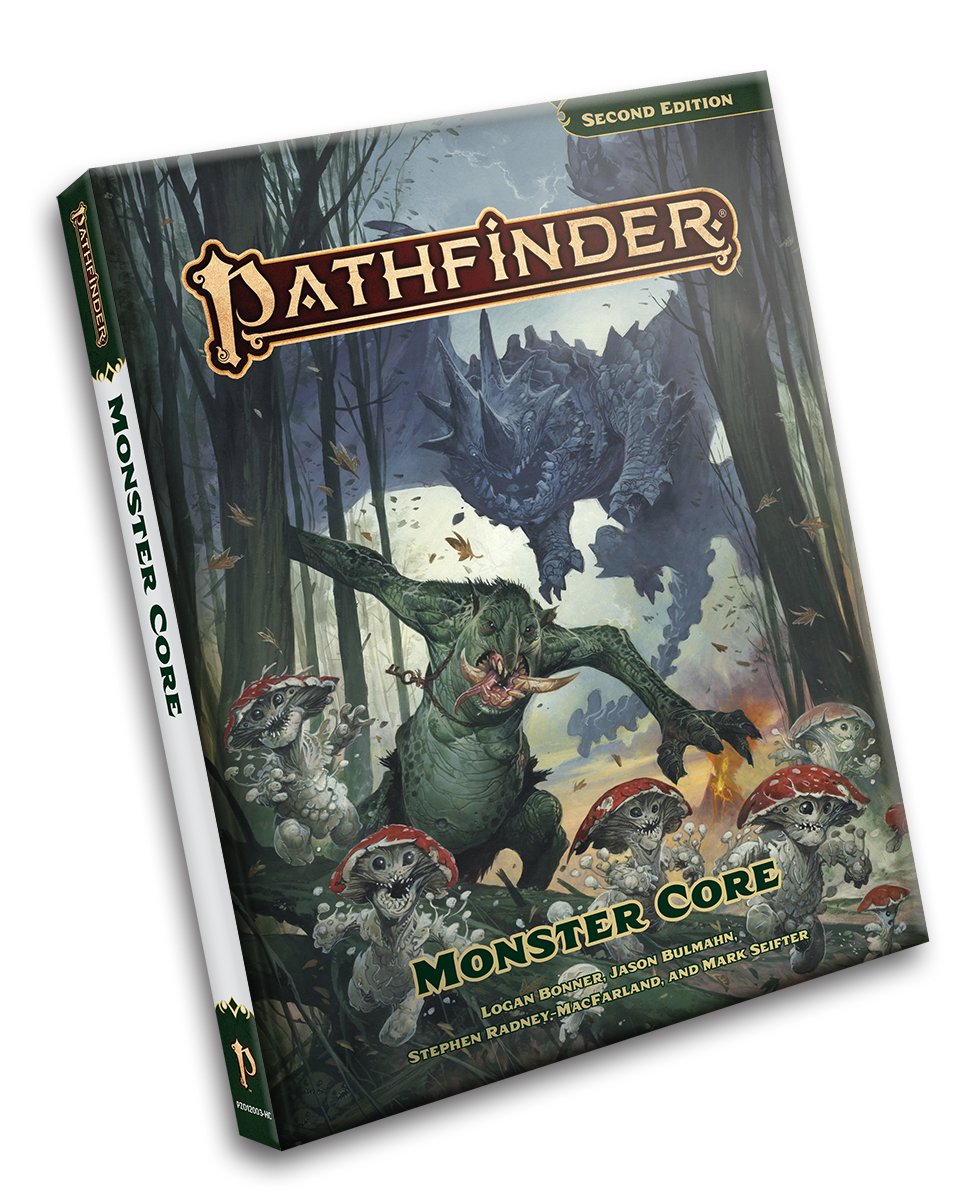
Buy Now
Option Availability
Standard
All options are of standard availability unless otherwise stated.
All monsters of common rarity are available for summoning spells (Pathfinder Player Core 360).
Limited
None
Restricted
Deities
Gogunta (page 45) - unholy sanctification and inappropriate edicts
Treerazer (page 328) - unholy sanctification and inappropriate edicts and anathema
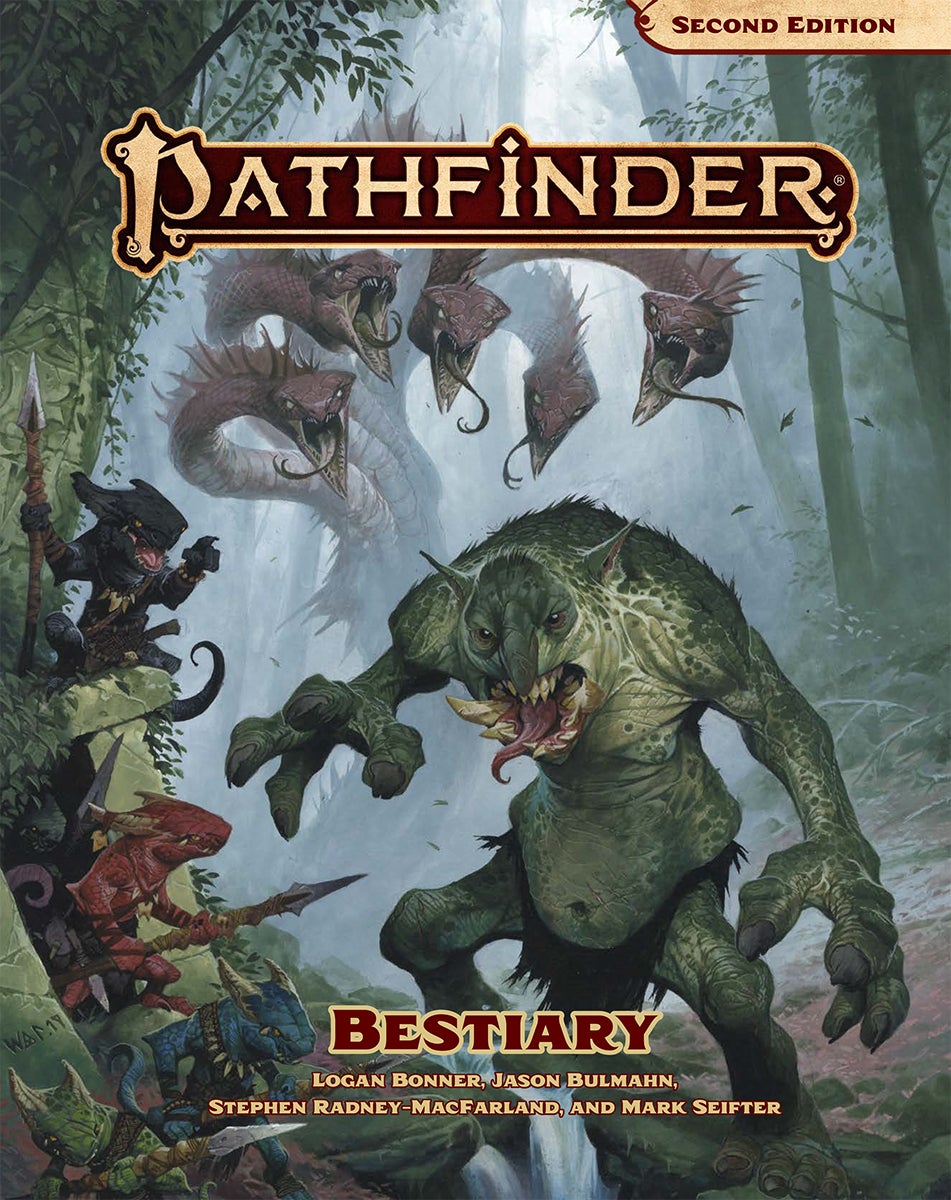
Learn More
Option Availability
Standard
All options are of standard availability unless specifically noted otherwise.
All monsters of common rarity are available for summoning spells (Pathfinder Core Rulebook 375).
Limited
None.
Restricted
Deities: Treerazer (page 312)
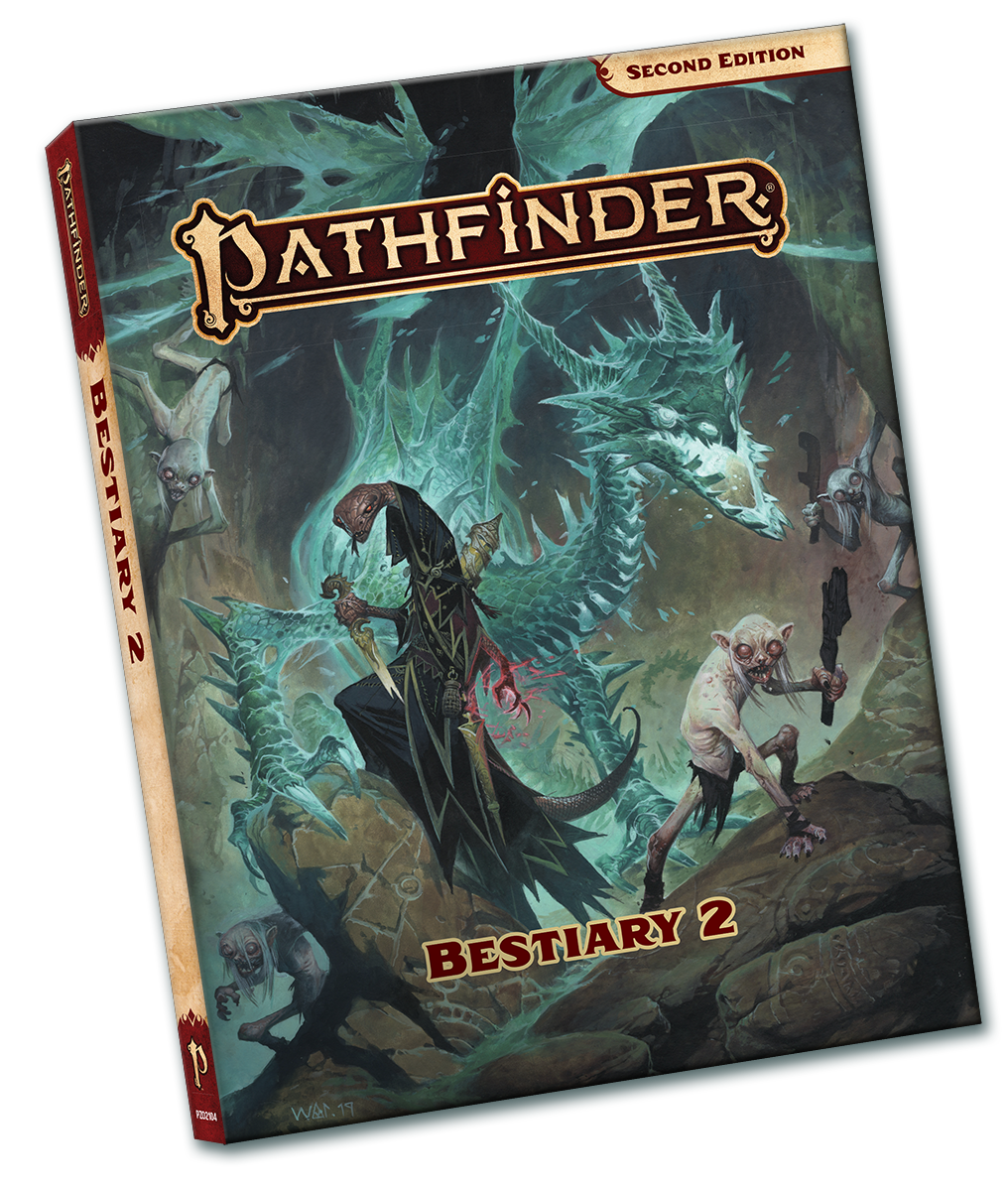
Learn More
In addition to this sanctioning, please reference the Pathfinder Bestiary 2 Errata for additional changes and clarifications to game rules.
Option Availability
Standard
All options are of standard availability.
All monsters of common rarity are available for summoning spells (Pathfinder Core Rulebook 375).
Limited
None.
Restricted
Deities: Ydersius (page 237)
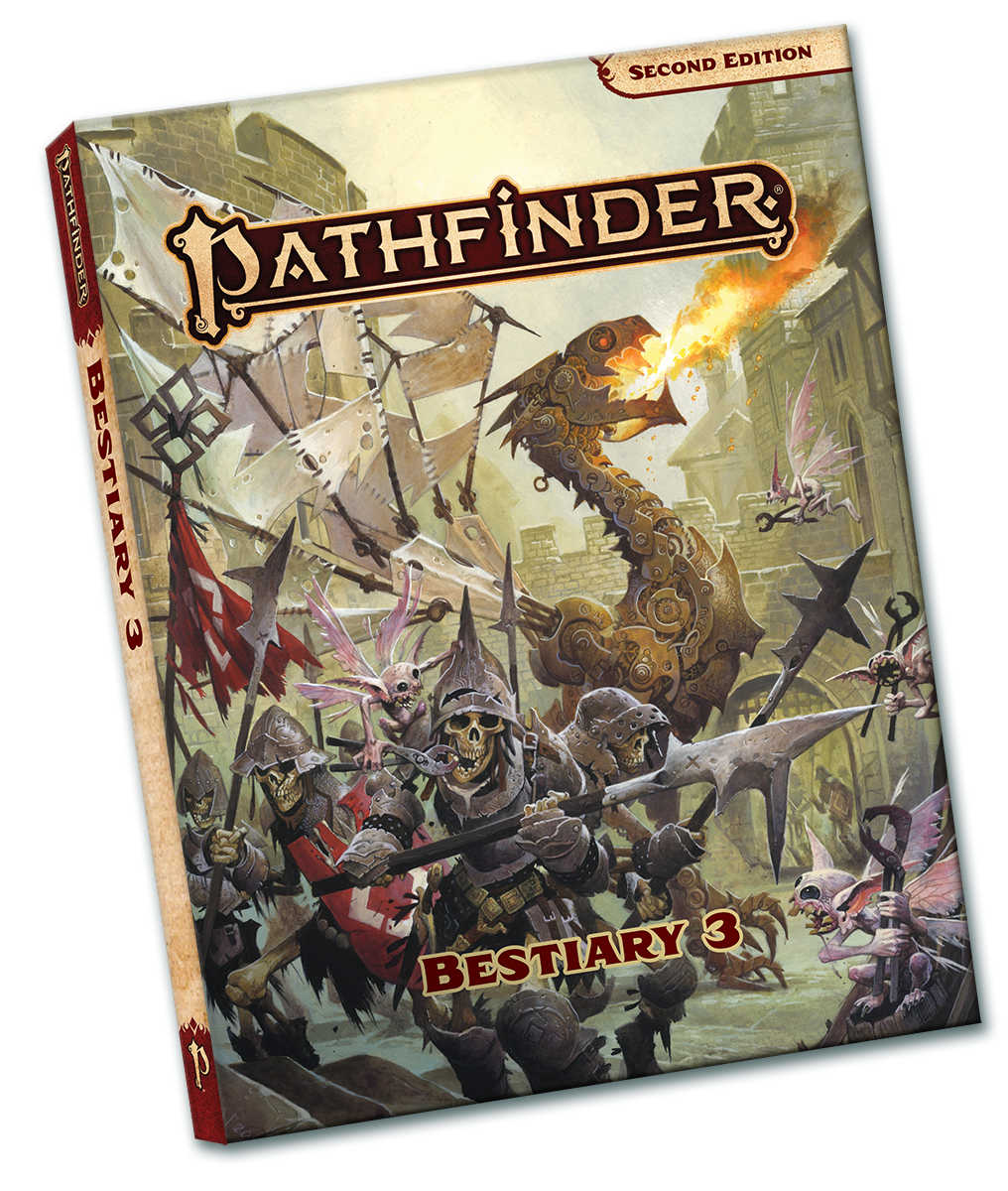
Learn More
Option Availability
Standard
All options are of standard availability unless otherwise noted below.
All monsters of common rarity are available for summoning spells (Pathfinder Core Rulebook 375) unless otherwise noted below.
Limited
Monsters: Empress Bore Worm
Hellwasp Swarm
Peri
Squirming SwillThe rules for customizing monsters (e.g. the “More Beheaded Abilities" sidebar on page 30) are not used in Organized Play.
Restricted
Deities: Ahriman, Lord of the Divs (page 68)
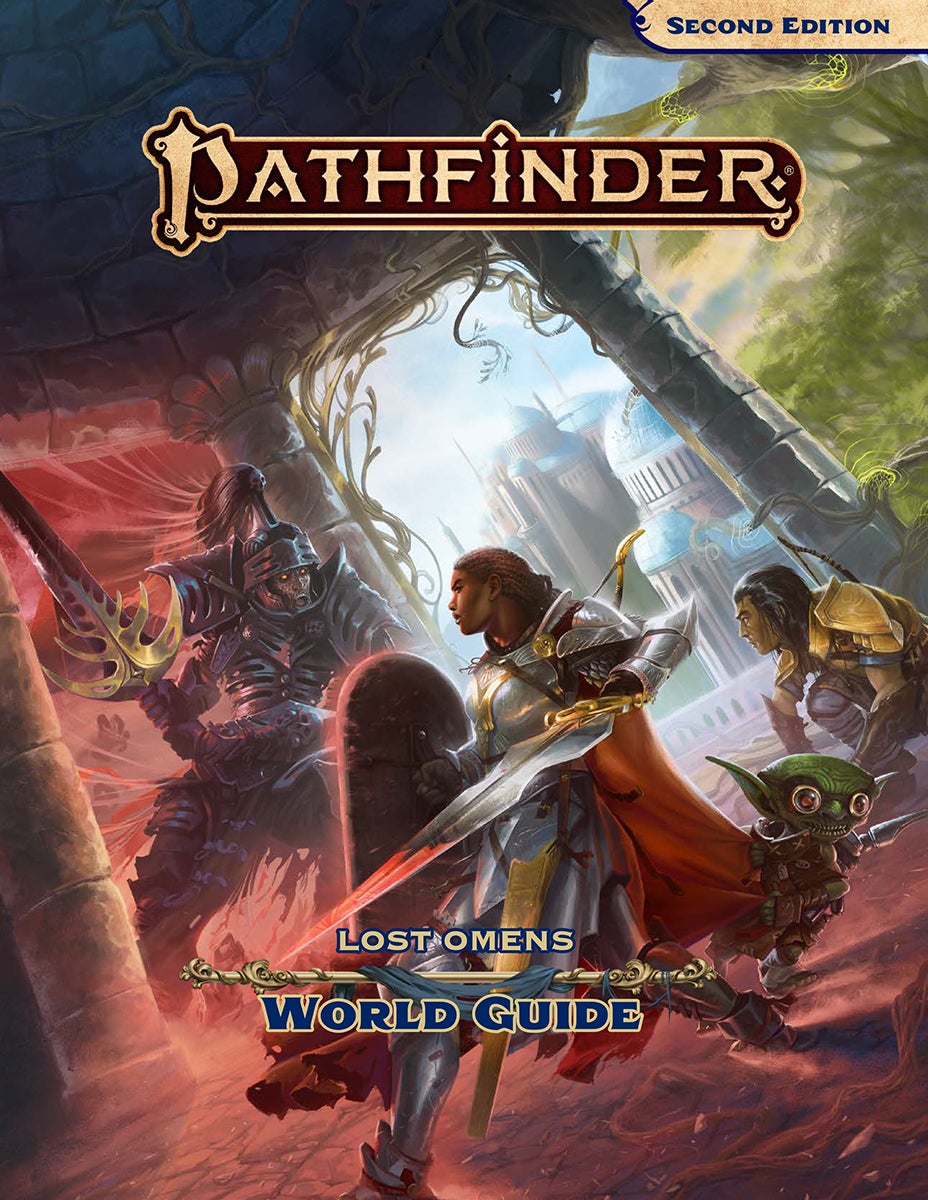
Learn More
Remember that a character’s ethnicity, area of origin (nationality), or membership in certain factions might grant access to options in this book. For more information, consult the Character Origin and Organizational Memberships section of the Guide to Organized Play: Pathfinder Society.
Rarity and Access Adjustments
Please use these rarity and access adjustments in Society Play, instead of the rarity and access printed in the original source.
Archetypes: All characters have access to Pathfinder Agent Dedication and all Pathfinder Agent feats (page 21).
Characters with the Living Monolith Dedication feat have access to Ka Stone Ritual (page 59).
Characters from the Mwangi Expanse have access to the Magic Warrior Dedication feat (page 95). This feat should be uncommon (see Rulings and Clarifications, below)
All uncommon organization options are available to members of the associated organization.Items: All characters have access to the archaic wayfinder (page 17).
Characters from the Broken Lands have access to the Aldori dueling sword (page 28).
All characters of 10th level or higher who are from the High Seas have access to black pearl aeon stones (page 63).
Orcs and half-orcs from the Mwangi Expanse have access to blessed tattoos (page 92).Option Availability
Standard
All options are of standard availability unless specifically noted otherwise.
Limited
Feats: Eye of the Arclords (page 81)
Items: Golden Legion epaulet (page 124)
Restricted
Archetypes: Red Mantis Assassin Dedication and all Red Mantis assassin archetype feats (page 71).
Items: Pesh (refined) (page 52).
Rulings and Clarifications
The following rulings and clarifications are based on upcoming errata for this product.
- The Aldori dueling sword’s (page 28) price should be 2 gp, not 20 gp.
- Magic Warrior Dedication (page 95) should have the uncommon trait.
Additionally, please follow these rulings and clarifications specific to Pathfinder Society play wherever they conflict with the language printed in the original source.
- The Prerequisites entry for Living Monolith Dedication (page 59) is “Osiriani language, trained in Crafting” rather than “Ancient Osiriani and Sphinx languages, trained in Crafting.”
The Prerequisites entry for Ka Stone Ritual (page 59) is “Living Monolith Dedication” rather than “Living Monolith Dedication, a sphinx or living monolith with this feat performs a ritual with you”.
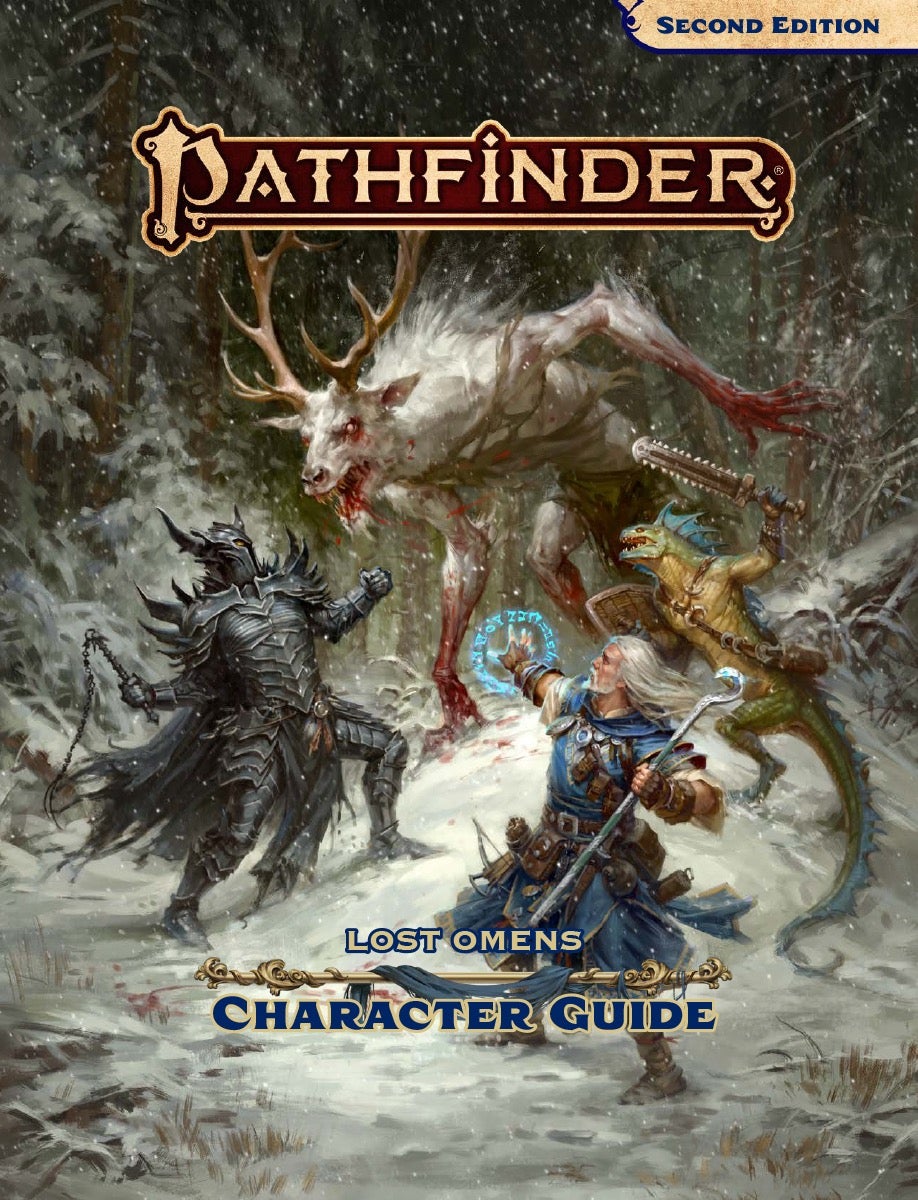
Learn More
Remember that a character’s ethnicity, area of origin (nationality), or membership in certain factions might grant access to options in this book. For more information, consult the Character Origin and Organizational Memberships section of the Guide to Organized Play: Pathfinder Society.
Rarity and Access Adjustments
As of the start of Pathfinder Society Year 3 (August 2021), all characters have access to the leshy ancestry without requiring a boon.
Option Availability
Standard
Ancestries: All ancestry options are of standard availability. As the hobgoblin and lizardfolk ancestries are uncommon, this means they are limited to boon access through Chronicle Sheets or the Achievement Point system. The leshy ancestry is open to all characters; however, all other leshy options follow the standard access rules.
All other options are of standard availability unless specifically noted otherwise.
Limited
None.
Restricted
Ancestries: Chosen of Lamashtu (page 38).
Rulings and Clarifications
The following rulings and clarifications are based on upcoming errata for this product.
- The design and development teams have clarified that the ancient elf heritage (page 25) requires an elven lifespan (a feature that half-elves do not have) and thus cannot be selected by half-elves using the Elf Atavism feat (Core Rulebook 58), only by full elves. Clarifying text has been added to the errata for this book.
- Eclectic Obsession (page 33) should be a single action and have the one-action symbol accordingly.
- Hobgoblin Weapon Familiarity (page 50) should contain fewer weapons. The updated text should read “You are trained with composite longbows, composite shortbows, glaives, longbows, longswords, and shortbows.”
- Leshys with the fungus leshy heritage (page 53) do not have the plant trait listed in the leshy base statistics sidebar, but have the fungus trait instead.
- The seedpod ranged unarmed attack granted by the Seedpod feat (page 54) has a range increment (not a flat range) of 10 feet.
- Add Amurrun to the list in the lizardfolk base statistics sidebar (page 57) of additional languages you can choose if you have a positive Intelligence modifier.
- Impassable Wall Stance (page 90) should have the stance trait.
- The key spellcasting ability for the spells granted by Invoke the Crimson Oath (page 95) is Charisma.
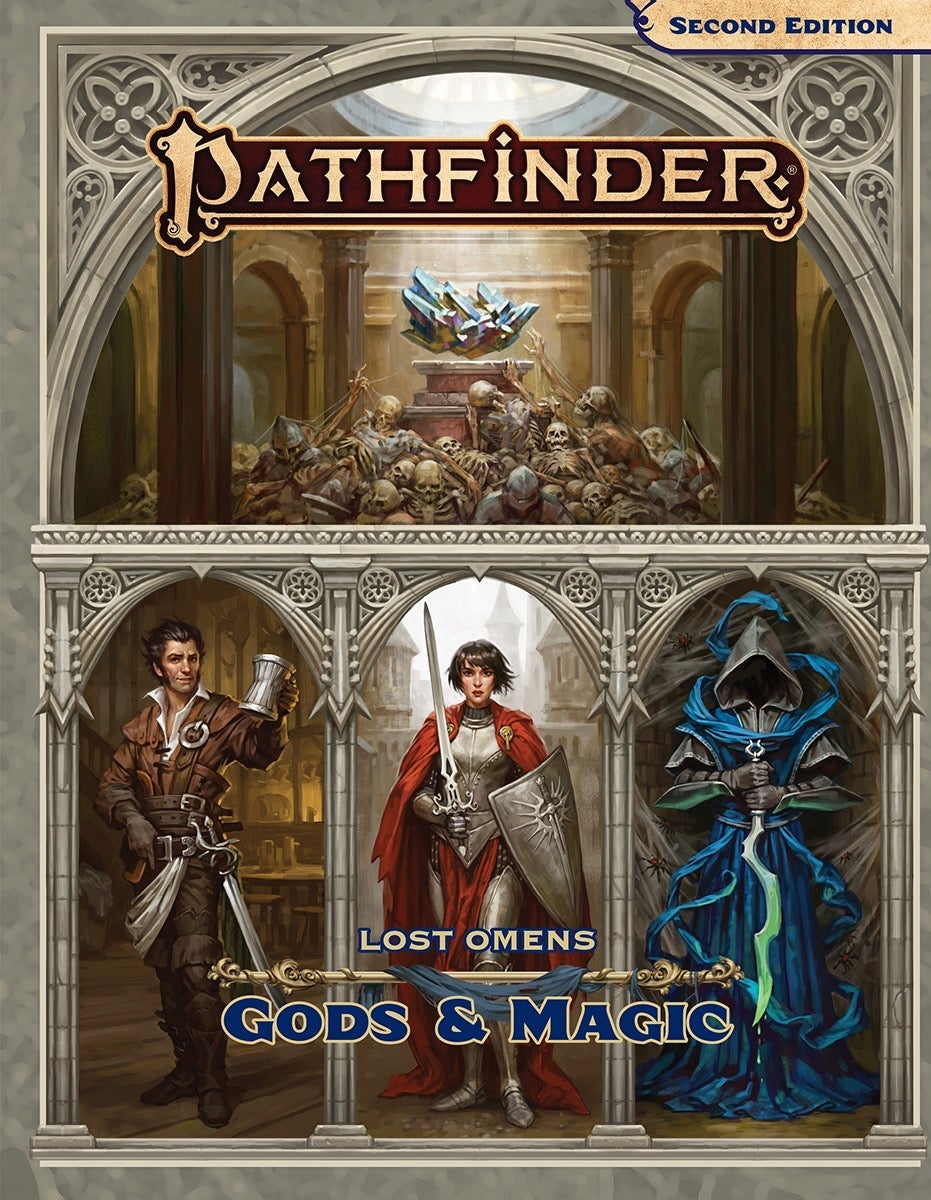
Learn More
Remember that a character’s religion might grant access to options in this book, even if they are not a cleric or champion. For more information, consult the Religion section of the Guide to Organized Play: Pathfinder Society.
Rarity and Access Adjustments
Deities: The Pillars of Knowledge, Prismatic Ray, and Wards of the Pharaoh pantheons that originally appeared in the January 21, 2020 Paizo Blog entry, “Friends in High Places” are available for Society play and can be selected following the normal rules for pantheons.
Items: Characters from Numeria have access to the polytool (page 121).
Option Availability
Standard
All options are of standard availability unless specifically noted otherwise.
Limited
Deities: Achaekek (page 52).
Spells: Time beacon (page 111)
Restricted
Deities:
- All archdevils (page 124).
- All demon lords (page 124).
- Anghazan (page 124)
- Ayrzul and Kelizandri (page 126)
- The four Horsemen (page 128)
- All outer gods and great old ones (page 130)
- Dahak (page 130)
- Gyronna (page 130)
- Walkena (page 130)
- Zyphus (page 130)
- All queens of the night (page 132)
- Fumeiyoshi and Lady Nanbyo (page 132)
- Dhalavei and Lahkgya (page 132)
Feats: Splinter Faith (page 8).
Rulings and Clarifications
Please follow these rulings and clarifications specific to Pathfinder Society play wherever they conflict with the language printed in the original source.
- GMs cannot enact divine intercessions.
- Remove the final sentence of Syncretism (page 105) that specifies the feat’s benefit if your cleric doctrine is not cloistered cleric or warpriest. Organized Play will reexamine this feat when additional cleric doctrines are released.
- For the purposes of Society play, remove the final clause of Evangelize (page 105) that states “at the GM’s discretion, a target that genuinely changes its perspective to support your faith as a result of the argument is also otherwise unaffected.”
- As Mortal Healing (page 105) requires you to specifically use the Treat Wounds action, it does not apply when used with other actions related to medicine or healing, such as Battle Medicine.
- When using Sanctify Water (page 105) use your proficiency with simple weapons to determine your attack bonus when throwing the blessed container of water. If you give the container to another character for them to throw, they use their proficiency with improvised weapons instead.
- For the purposes of Society play, remove the Prerequisites of Numb to Death (page 105) that states “you have died at least once.''
- The temporary tool spell (page 111) can be used to create only simple tools, and therefore cannot create kits, which are complex objects made of multiple pieces, or objects made of any specific precious material.
- The Targets entry for winter bolt (page 112) should be “1 creature”, not “1 creature or object.” This change is based on upcoming errata for the Pathfinder Core Rulebook.
- The Targets entry for withering grasp (page 112) should be “1 creature or unattended object”, not “1 creature or object.” When used on an unattended object, the object takes persistent damage on your next turn.
- For the purposes of Society play, remove the final sentence of remember the lost (page 119) which states “A creature that truly knows no one who died with any sort of grievance to that creature is immune to this effect.”
- [NEW - Nov '22] Arundhat is also included in Pathfinder Lost Omens: Impossible Lands with burning blossoms as a cleric spell. Players may use either the version from that book or this book, but cannot use both. This choice must be made at the time the character is created.
- [NEW - Feb '22] In Pathfinder Society play, both Lissala and the Godclaw pantheon grant feeblemind in place of dominate.
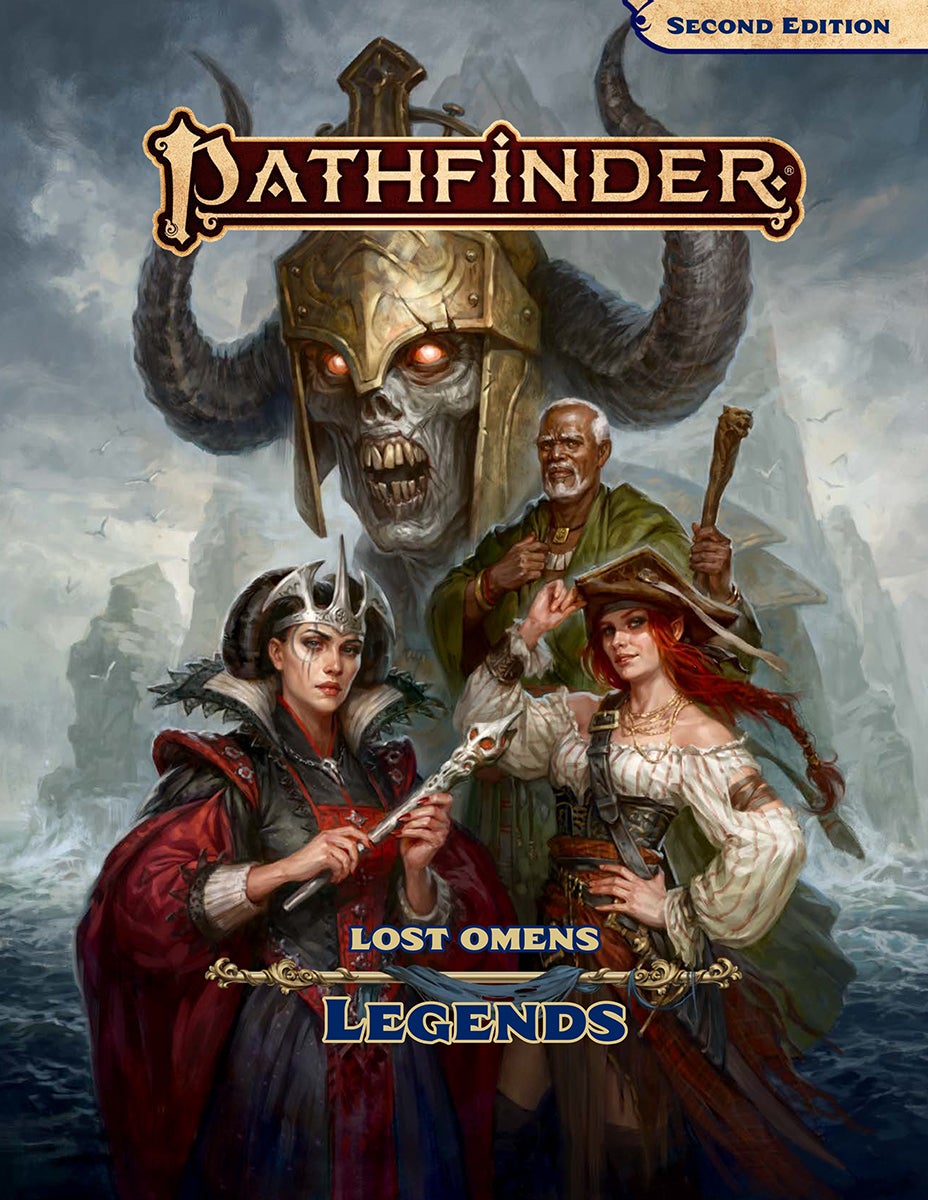
Learn More
Note that many of the options in this book are uncommon or rarer, as they represent the signature teachings, items, and ability of legendary figures.
Rarity and Access Adjustments
None.
Option Availability
Standard
All options are of standard availability unless specifically noted otherwise.
Limited
None.
Restricted
Items: All infernal contracts (page 10).
Addiction suppressant (page 72).
Hype, diluted hype, and plasma hype (page 81).
Archetypes: All rare Red Mantis assassin archetype feats (Achaekek’s Grip, Fading, and Vernai Training) (page 58).
Rulings and Clarifications
Please follow these rulings and clarifications specific to Pathfinder Society play wherever they conflict with the language printed in the original source.
- Spare wax cylinders for a clockwork recorder (page 24) cost 3 gp each and are the same rarity as the recorder itself (rare).
- Spare bolts for a palm crossbow (page 25) cost 2 sp for 10 bolts and are the same rarity as the crossbow itself (rare).
- For the purposes of Society play, the Azaersi’s Roads feat (page 28) can be used twice per Society adventure—once to travel from the Material Plane to the Plane of Earth, once to travel from the Plane of Earth to the Material Plane.
- For the purposes of Society play, the telepathic link created by a deepdread claw (page 28) ends when a Society adventure ends.
- Per design team clarification, an item animated by the spirit object (page 32) hex uses the spellcaster’s spell DC as its AC. Its Hardness and Hit Points remain unchanged from their normal values as listed on page 577 of the Core Rulebook.
- If a target of all is one, one is all (page 64) does not consent to the allocation of Hit Points resulting from this spell, they become an unwilling target and they (and their Hit Points) are removed from the spell’s effect. The spell can continue with any remaining targets.
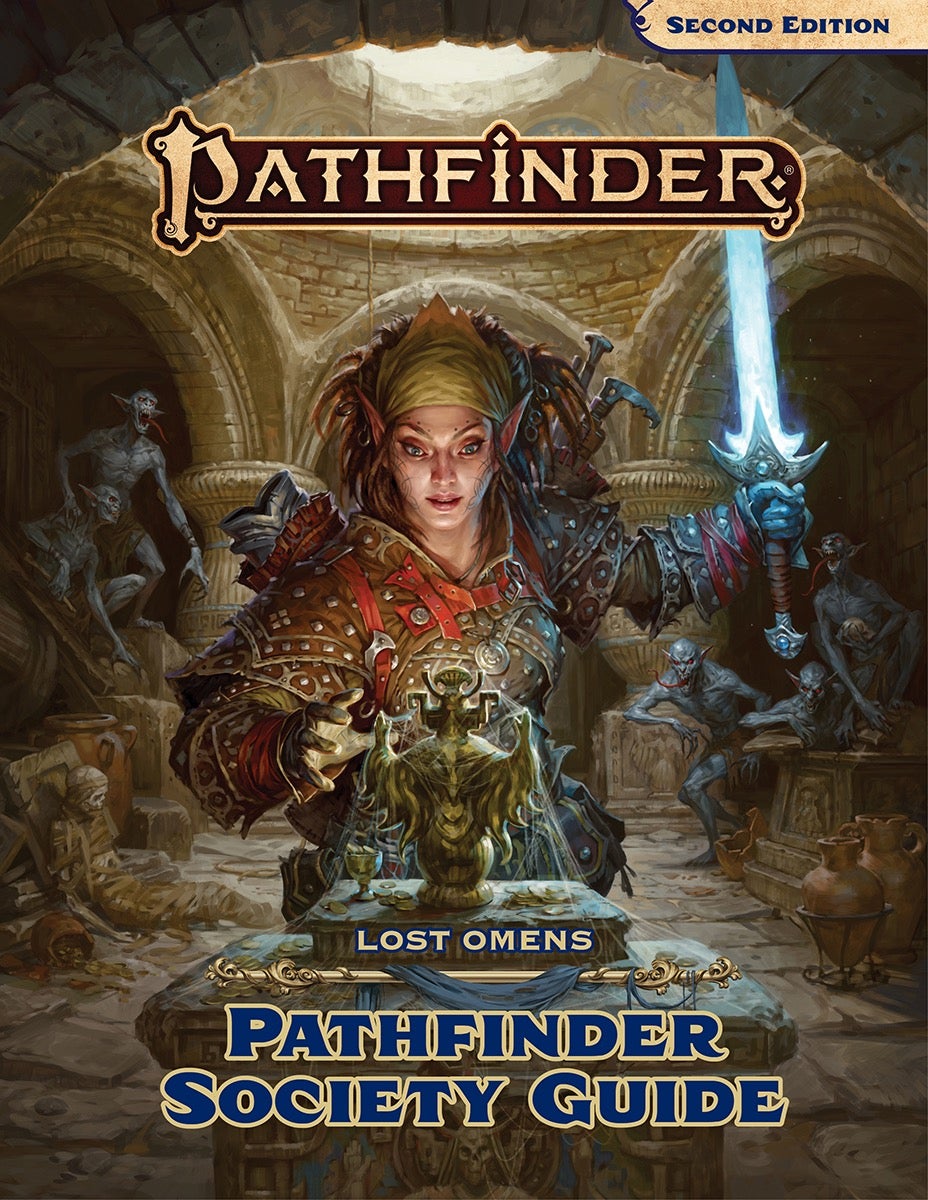
Learn More
As members of the Pathfinder Society, characters have automatic access to many uncommon options. Additional items appear as Chronicle Boons, which can be acquired once a character completes a related adventure. To access Chronicle Boons, visit your My Organized Play page.
Rarity and Access Adjustments
Items: Characters from the High Seas have access to the boarding pike and combat grapnel (page 81).
All characters have access to the everyneed pack (page 85).
As stated in the section introduction, all characters have access to the magic items in the Magic Items section on page 117, as well as the items, familiars and spells on pages 120-121.Feats: As stated in the section introduction, all characters have access to the uncommon (but not rare) options in the Academy Instructors section on pages 118–119.
Option Availability
Standard
All options are of standard availability unless specifically noted otherwise.
Limited
Faction Gear: All faction-specific gear (Envoy’s Alliance, page 26; Horizon Hunters, pages 29–30; Grand Archive, page 34; Vigilant Seal, pages 37–38). Players can gain access to each set of gear by taking the corresponding Faction Gear Access Game Reward, available when they reach 20 reputation with the respective faction.
Items: Razmiri wayfinder (pages 72–73)
talisman cord (page 117) - no longer functions with removal of spell schools
Restricted
None.
Rulings and Clarifications
Please follow these rulings and clarifications specific to Pathfinder Society play wherever they conflict with the language printed in the original source.
- The blade within a stiletto pen (page 30) is a simple weapon.
- All versions of metalmist spheres in this book (page 38) contain either cold iron or silver.
- The trigger for Master’s Counterspell (page 48) should begin with “A creature Casts a Spell that you have prepared or is in your repertoire...” to provide a trigger for spontaneous spellcasters as well as prepared spellcasters.
- A character with the Fane’s Fourberie feat (page 118) can etch their deck of cards with weapon runes themself or have this service provided by a third party. The deck can also be targeted by weapon-modifying effects such as a magic weapon spell.
- The saving throw for the calligraphy wyrm’s Ink Spray ability (page 122) should have a DC equal to the master’s spell DC or class DC, whichever is higher.
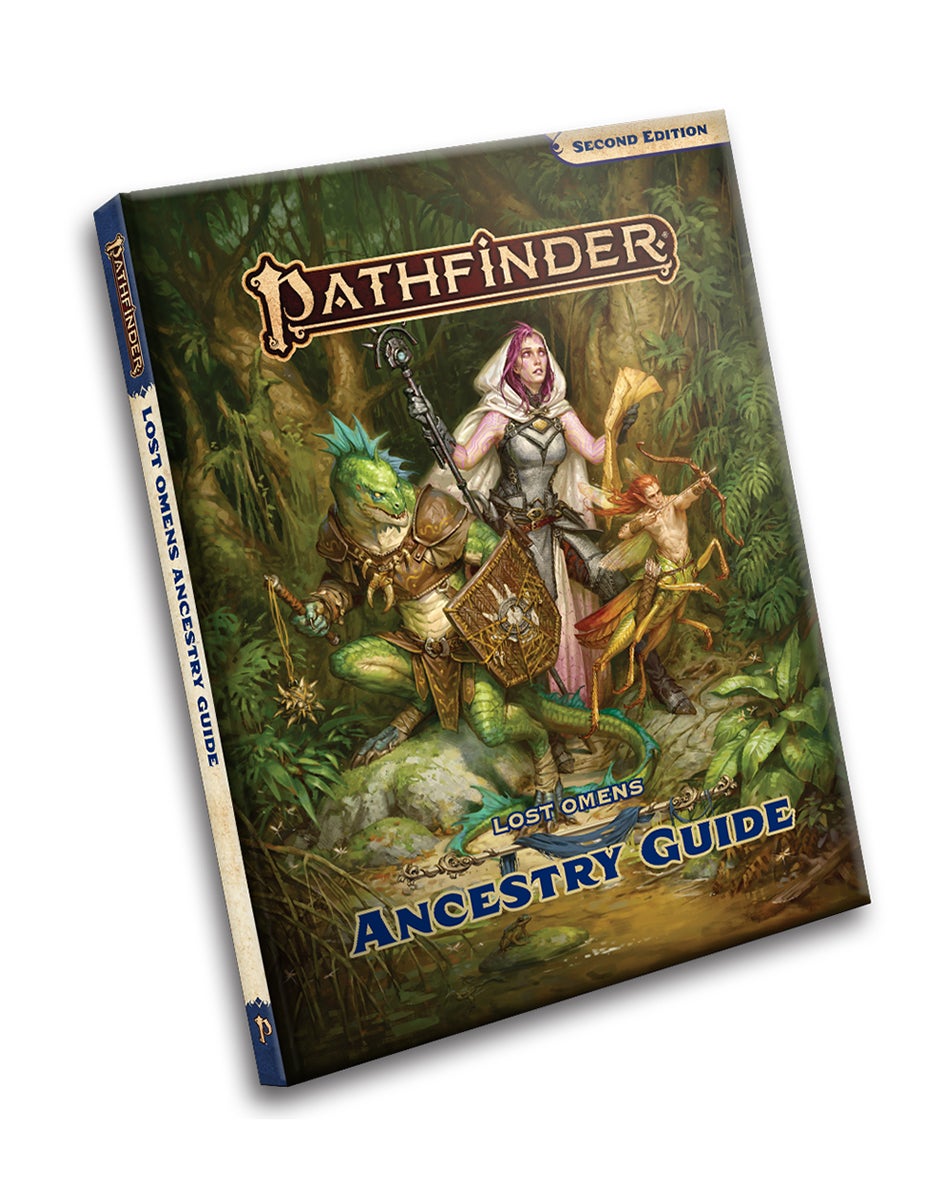
Learn More
In addition to this sanctioning, please reference the Lost Omens Ancestry Guide Clarifications and Errata for additional changes and clarifications to game rules.
Option Availability
Standard
All options are of Standard availability unless specifically noted otherwise.
Ancestries: All ancestry, heritage, and versatile heritage options are of standard availability. As the ancestries and versatile heritages presented in this book are all uncommon or rare, this means they are limited to boon access through Chronicle Sheets or the Achievement Point system.
Limited
Feats: Flame Jump (page 11)
Read the Stars (page 47)
Warren Friend (page 54)
Restricted
Feats: Strix Defender (page 136)
Rulings and Clarifications
Please follow these rulings and clarifications specific to Pathfinder Society play wherever they conflict with the language printed in the original source.
- Taste Blood (page 27): As specified in the feat, a PC who uses this feat on an unwilling target that is not an active combatant commits an evil act; in Pathfinder Society play, doing so earns the PC 1 Point of Infamy.
- Cloak of Poison (page 43): “An unarmed attack or melee weapon without the reach trait” refers to all unarmed attacks (whether they have the reach trait or not), as well as melee weapons without the reach trait.
- Tengu Feather Fan (page 48): The fan you gain from this feat is a held item (Pathfinder Core Rulebook 572).
- Hefting Shadow (page 87): Creatures other than the PC with the feat can store or retrieve items from the shadow; doing so is equally difficult to storing or retrieving items in a worn backpack (generally requiring Steal or a similar ability if the PC does not consent to have the item taken).
- Hybrid Form (page 124): Characters with hybrid form can retain elements of their kitsune form when they use Change Shape, but they do not have to (they can still change fully into their alternative form).
- [NEW 4/27/22] In Pathfinder Society play, corgi familiars can be independent. When a corgi is being ridden, it is following your PC's lead, and therefore does not apply any of the benefits or effects of being independent
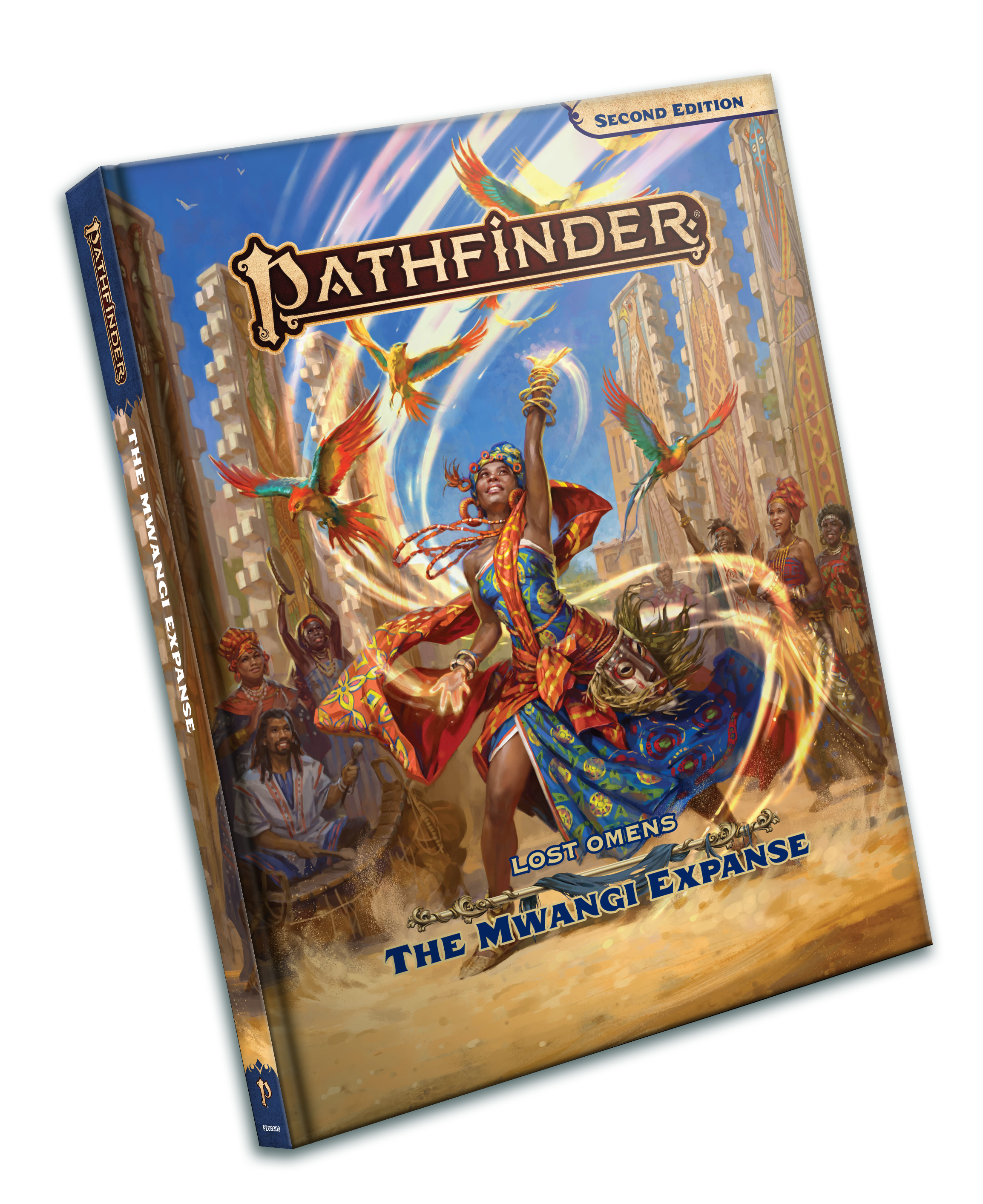
Learn More
Rarity and Access Adjustments
The suggested rarity adjustments of ancestries for characters from the Mwangi Expanse as described on page 23 are not used in Organized Play.
Option Availability
Standard
All options are of standard availability unless specifically noted otherwise.
The pantheons listed in the "Gods of the Expanse" blog post are available for Society play and can be selected following the normal rules for pantheons.
Limited
None.
Restricted
Deities: Angazhan (page 133)
Kitumu (page 158)
Walkena (page 143)Artifact: Jahan Waystone (page 207)
Contract: Oath of the Devoted (page 230)
Rulings and Clarifications
Please follow these rulings and clarifications specific to Pathfinder Society play wherever they conflict with the language printed in the original source.
- The genealogy mask (page 34) may be purchased to strengthen your character’s story and roleplay, but cannot be used to impact gameplay during Organized Play adventures.
- The Friendform ancestry feat (page 104) can be used during daily preparations to exchange tokens with other PCs. It cannot be used with NPCs, and the benefits of the ritual do not carry over between adventures.
- [NEW - November 2022] - The wyrmblessed sorcerer bloodline (page 75) provides options for primal and imperial dragons. Character with a similar draconic connection, such as draconic bloodline sorcerors or draconic instinct barbarians, can also select from these dragon types. You must own a copy of Lost Omens: The Mwangi Expanse to select these options.
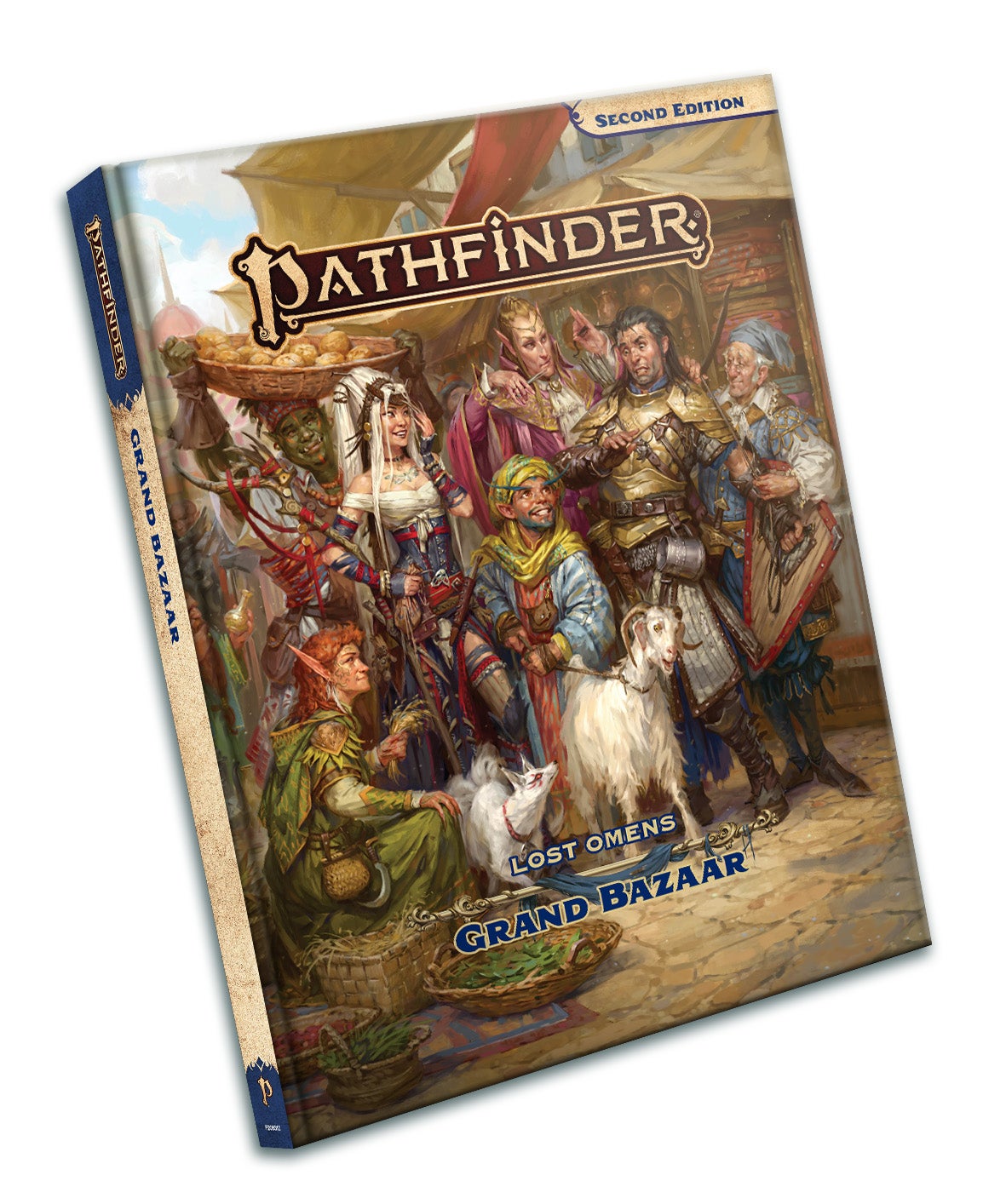
Buy Now
Rarity and Access Adjustments
Due to their connection to the shop’s proprietor, all Pathfinder Society agents have access to the items from Barghest’s Bin on pages 10-11. All Pathfinder Society agents also have access to all assistive items from Morhen’s Mobility Apparel on pages 67-73 without owning a copy of Lost Omens: The Grand Bazaar. Other options are available for purchase in the Boon Store using the Frequent Shopper boons.
Standard
All options are of standard availability unless specifically noted otherwise.
Limited
Items
juxtaposition ammunition (page 19)
toadskin salve (page 27)
vexing vapor (page 27)
experimental clothing (page 50)
Restricted
Items
vampiric scythe (page 31)
All vehicles and structures are Restricted, due to their unsuitability for the constraints of Organized Play.
Clarifications
Please follow these rulings and clarifications specific to Pathfinder Society play wherever they conflict with the language printed in the original source.
- For the impossible cake, “type of item” refers to a broad category of items such as books, spells, etc, not a specific object.
- The effects of the implacable rune only activate when an enemy causes the effect to apply.
- The throwing knife listed on page 107 is legal for play; the version previously published in the Extinction Curse Adventure Path is not permitted for play.
- The magnifying glass of elucidation is available for purchase for any common languages, as well as any other languages to which a PC has gained access.
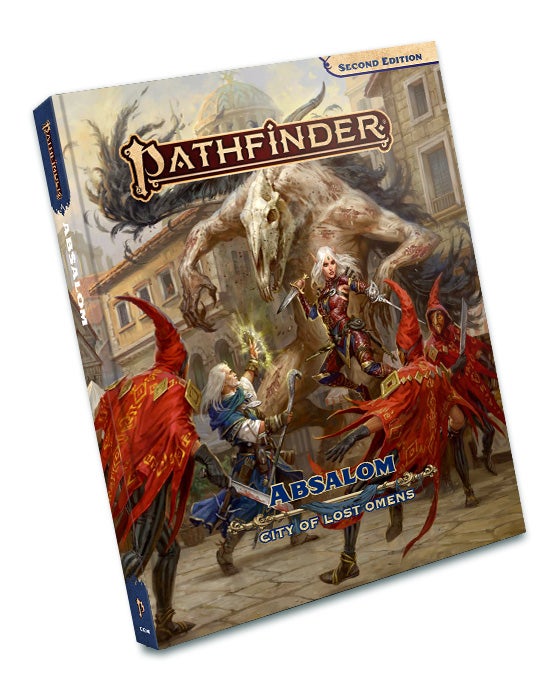
Buy Now
Rarity and Access Adjustments
PCs from the High Seas region have access to the boarding axe (page 391).
Standard
All options are of standard availability unless specifically noted otherwise.
Limited
The City at the Center of the World trait on page 20 does not apply to the Pathfinder Society campaign. The Guides and Touts sidebar on page 32 and the Mandates sidebar on page 77 do not apply unless specifically called out by a scenario.
Restricted
All drugs (page 391)
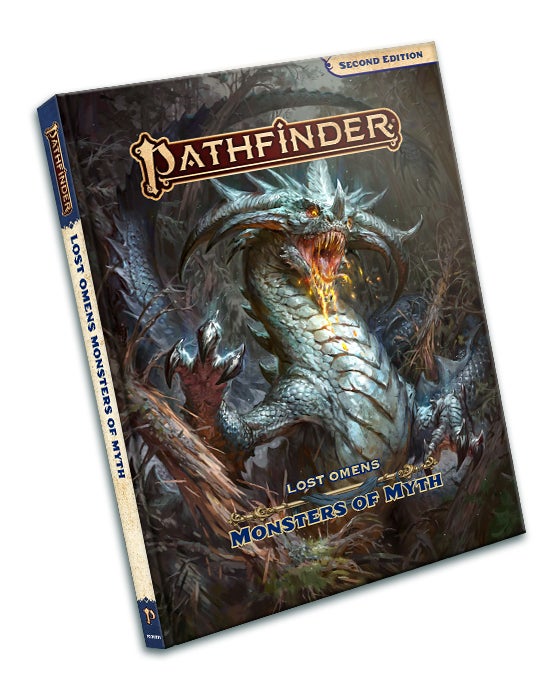
Buy Now
Standard
All options are of standard availability unless specifically noted otherwise. As all items in this book are Rare or Unique, access is not granted without a boon indicating otherwise.
Limited
None
Restricted
None
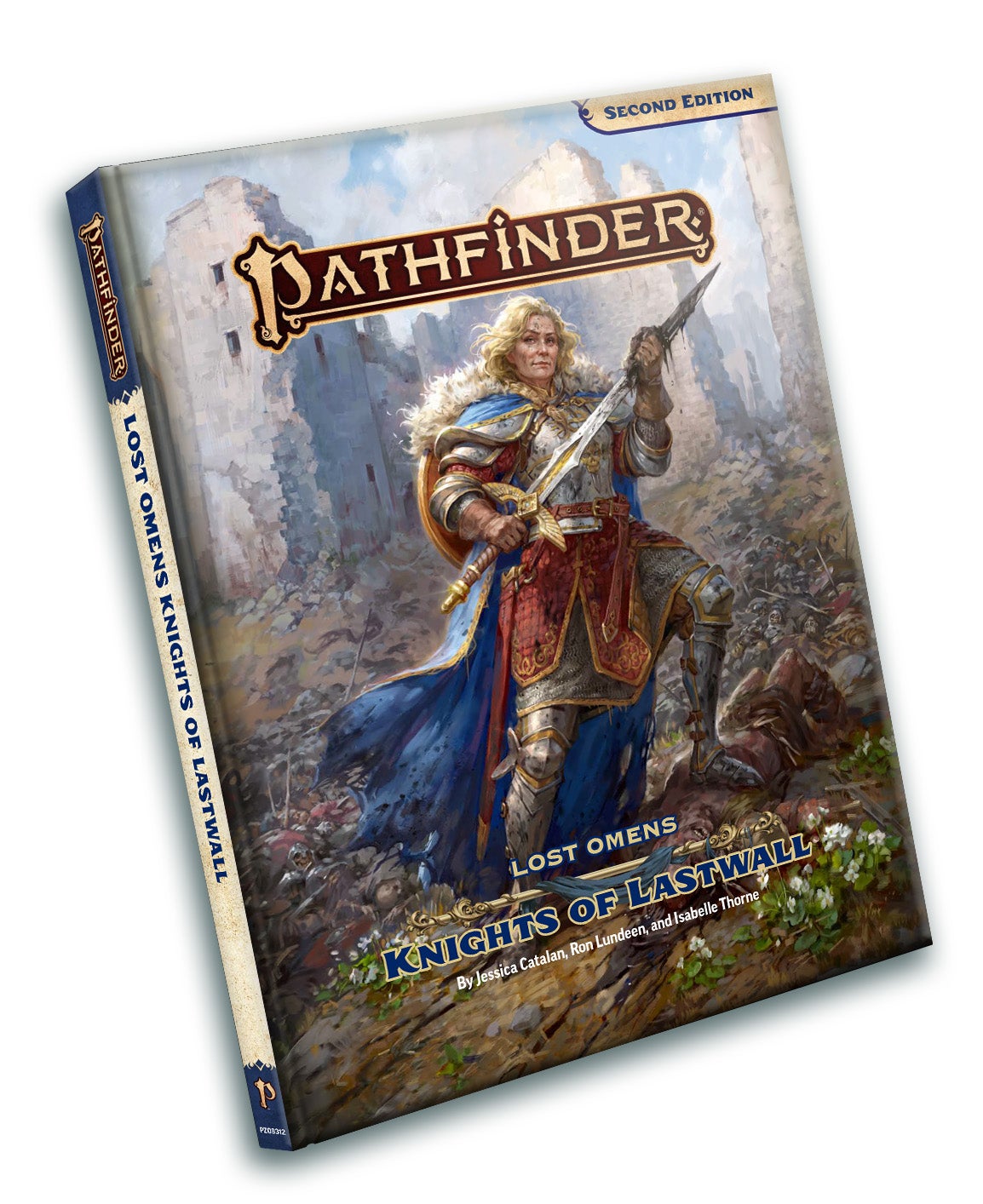
Buy Now
Remember that a character’s membership in an organization might grant access to options in this book. Characters can purchase the Secondary Initiation boon in the Boon store to join an organization such as the Knights of Lastwall in addition to the Pathfinder Society. For more information, consult the Character Creation section of the Guide to Organized Play: Pathfinder Society.
Standard
All options are of standard availability unless specifically noted otherwise.
Limited
Feats
Emissary of Peace (page 74)
Restricted
Undead compendium (page 90)
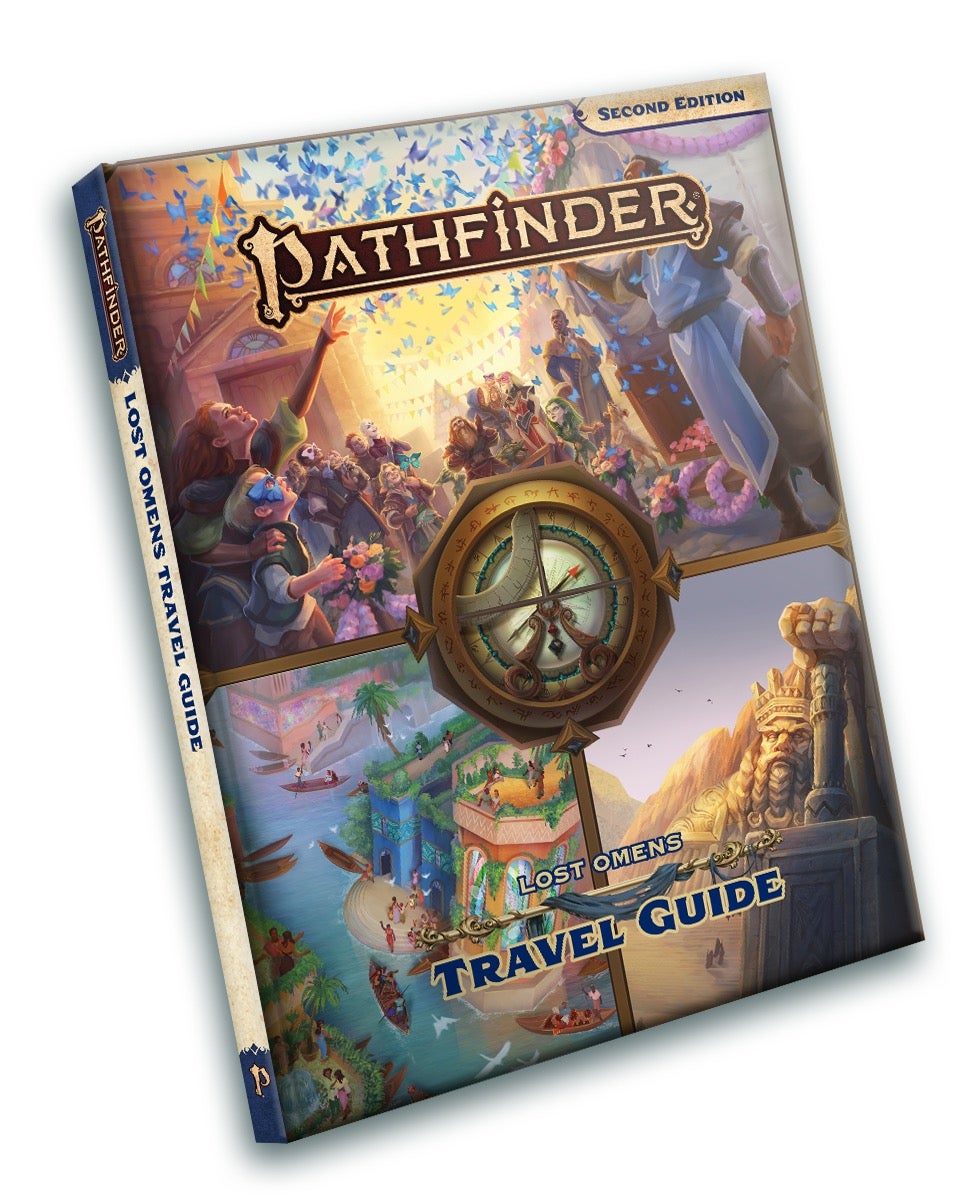
Buy Now
Standard
All options are of standard availability unless specifically noted otherwise.
Limited
None
Restricted
The rules for Housing Costs (page 17) are not used in the Pathfinder Society campaign.
Clarifications
- The Cosmic Caravan pantheon (page 92) is legal for play using Tsukiyo instead of Groetus. Groetus was listed as a member of the pantheon in a different source, but is not treated as a current member of the pantheon in the Pathfinder Society campaign.
- The Offering Plate pantheon (page 94) incorrectly lists cozy cabin as a 2nd-level spell. Cozy cabin is a 3rd-level spell as originally printed in the Advanced Player’s Guide.
- The DC to remove the sickened condition from an artevil suspension (page 101) is the standard DC for an item of its level (in this case, DC 17).
- As stated on page 103, the animals listed can be purchased as pets, but cannot be combat trained or contribute to combat in any way.
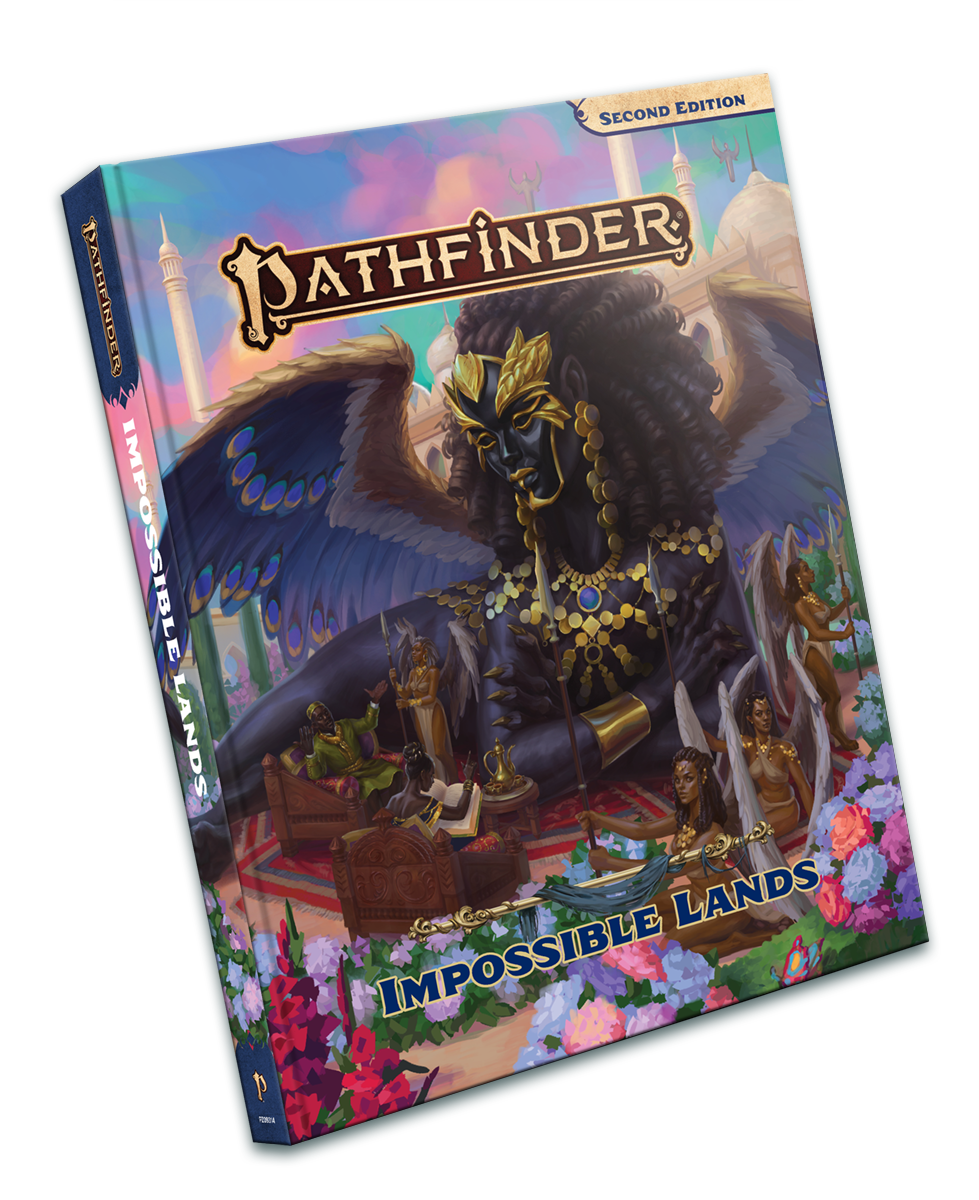
Buy Now
Remember that a character’s ethnicity, area of origin (nationality), or membership in certain factions might grant access to options in this book. For more information, consult the Character Origin and Organizational Memberships section of the Guide to Organized Play: Pathfinder Society.
Standard
All options are of standard availability unless specifically noted otherwise.
Limited
[NEW] Items: sunflower censer (page 178) - no longer functions with the removal of spell schools.
Restricted
Feats
Reimagine (Kashrishi; page 45)
Note: the Community Knowledge kashrishi feat was previously restricted; it is now Standard access.
Curses
All curses and div curses (page 176)
Items
All Abraxan tattoos (page 305)
Deities
Mahathallah (page 316)
Clarifications
Please follow these rulings and clarifications specific to Pathfinder Society play wherever they conflict with the language printed in the original source.
- The DC of the Dominion Aura feat (page 33) is the higher of your class DC or spell DC.
- As usual for archetypes, players who take the Shieldmarshal dedication feat (page 108) can't select another dedication feat until they have gained two other feats from the Shieldmarshal archetype.
- Characters who have gained access to the Fey Influence feat from a Pathfinder Society scenario gain access to the expanded version of this feat printed on page 126. This does not grant access to any additional feats in this section.
- The Jalmeri Heavenseeker archetype as printed in this book (page 224) is legal for play. Players may not use the version printed in Pathfinder #158: Six Feet Under.
- Arundhat was previously included in Pathfinder Lost Omens: Gods and Magic with ghostly touch as a cleric spell. Players may use either the version from that book or this book, but cannot use both. This choice must be made at the time the character is created.
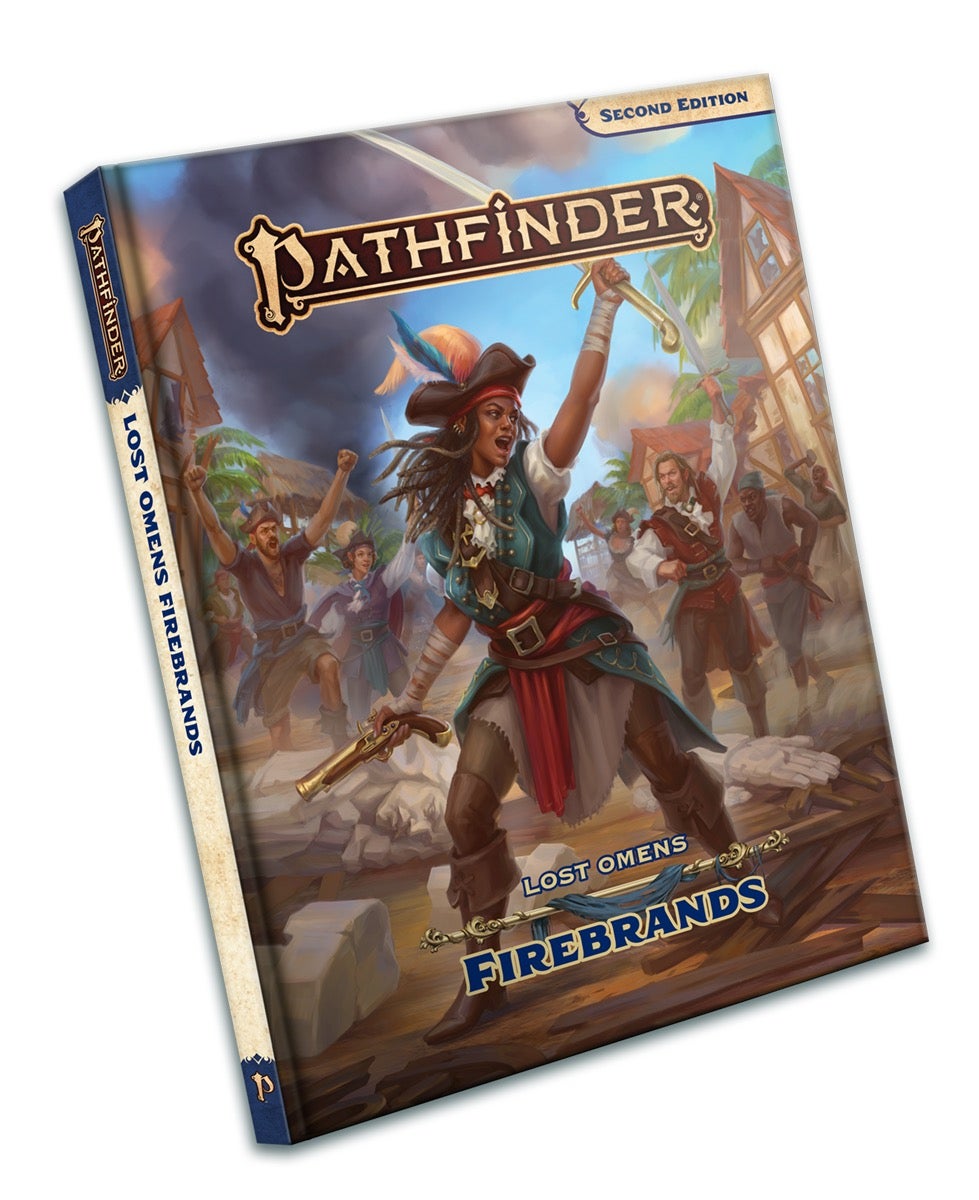
Buy Now
Remember that a character’s membership in an organization might grant access to options in this book. Characters can purchase the Secondary Initiation boon in the Boon store to join an organization such as the Firebrands in addition to the Pathfinder Society. For more information, consult the Character Creation section of the Guide to Organized Play: Pathfinder Society.
Standard
All options are of standard availability unless specifically noted otherwise.
Limited
All Services (page 95) - if such services are necessary for a scenario, they will be offered by the Pathfinder Society or included in the scenario
Restricted
Feats
- Ostentatious Reload (page 76) - no downside at higher levels as DC becomes trivial
- Quick Spring (page 81) - effectively doubles all movement speeds
Spells
- flashy disappearance (page 89) - unclear if enemies can detect target with non-visual senses; one-action level 1 spell that completely avoids enemy reactions
- illusory shroud (page 89) - level 2 spell that allows characters to hide in plain sight
- instant parade (page 89) - level 2 spell that grants 10 minutes of invisibility which doesn’t break when taking hostile actions
- nothing up my sleeve (page 90) - undetectable smuggling spells have potential to break scenarios
Items
pesh paste (page 119) - drugs are not allowed in Organized Play
Rulings & Clarifications
- The Thrill-Seeker background (page 75) grants ability boosts to Strength and Constitution.
- Rolling Landing’s text (page 76) only affects the reaction used after a fall, not any reaction.
- The Critical Success effect of Devrin’s Cunning Stance (page 78) to deny an enemy’s reaction only applies if an ally’s Strike is successful against a flat-footed enemy.
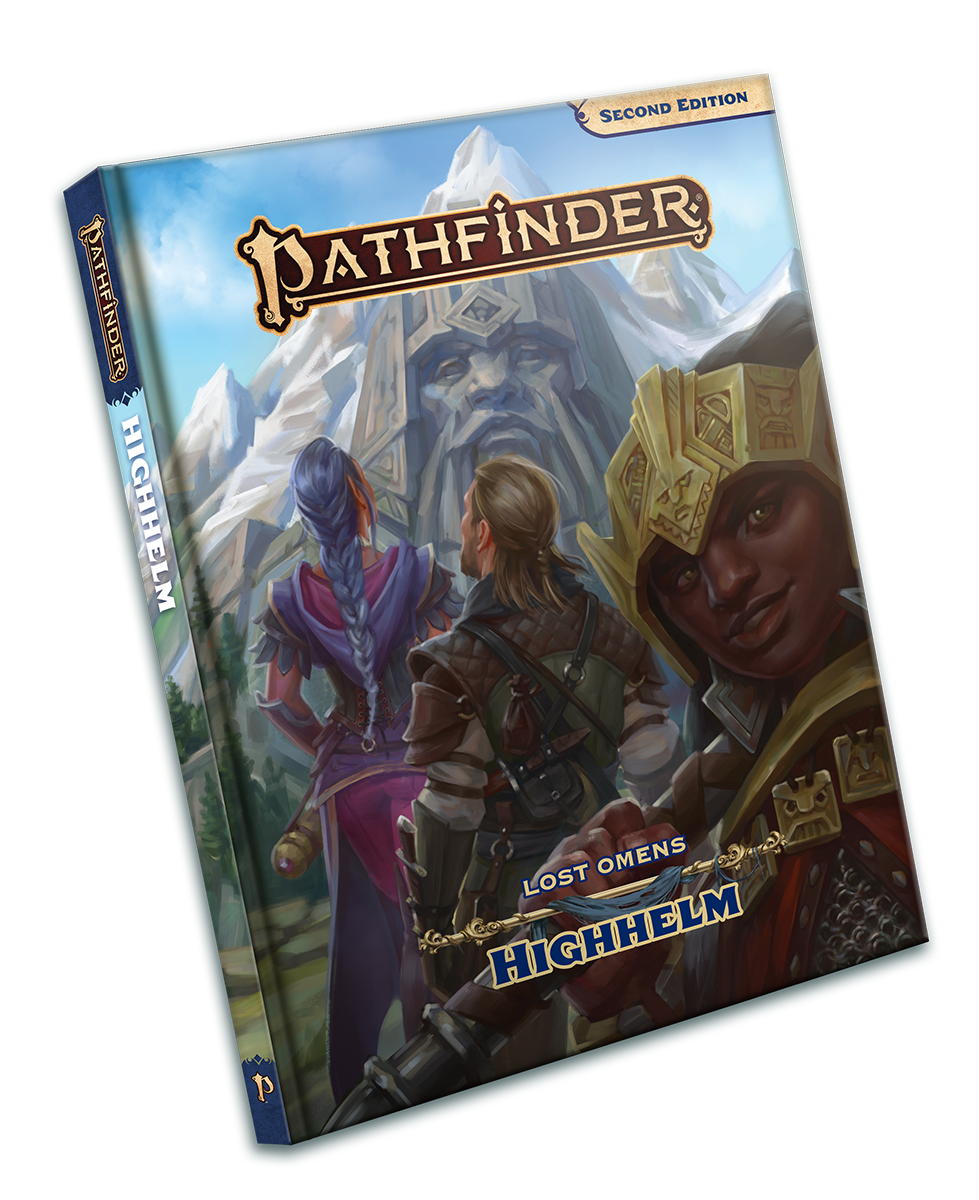
Buy Now
Standard
All options are of standard availability unless specifically noted otherwise.
Limited
- Bloodhammer Reserve (page 86; basic version only) - turning into a shark on land will either remove a PC from an encounter or kill them. The higher-level versions are accessible with the Avid Collector–Highhelm boon.
Restricted
- everair mask (page 112) - level 2 item which replicates higher-level consumables and spells
Rulings & Clarifications
- The Clan Lore feat (page 108) can only be used to join the clans listed on that page (or any future clans published in official products). You may not change the skills or clan selected during downtime.
- A Forge-Blessed dwarf (page 109) can use their granted 1st-level spell once per scenario.
- Some deities in this book added alternate domains (such as Bolka’s toil domain). These are permitted for all followers of these deities.
- Angradd (page 116) is printed with different divine abilities and Folgrit (page 119) is printed with a different divine skill from their initial printings in Gods & Magic. Players may use either the version from that book or this book, but cannot use both. This choice must be made at the time the character is created.
- Folgrit’s third granted spell is 9th-level resplendent mansion as initially printed; the spell is not granted as a 6th-level spell.
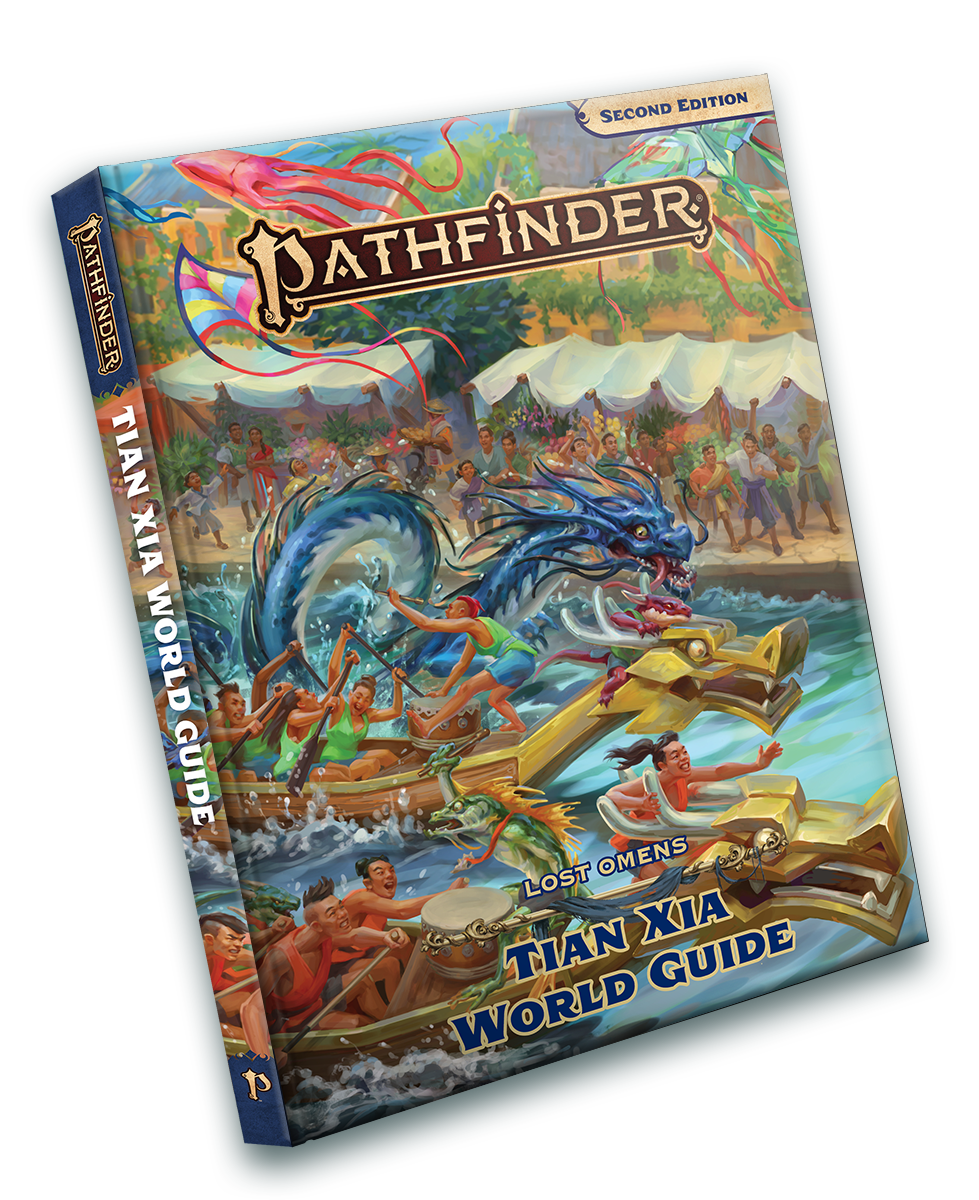
Buy Now
Standard
All options are of standard availability unless specifically noted otherwise.
Limited
Tests of Virtue (page 50) - Rituals are not used in PFS play
Tian Xia ships (page 266) - Vehicles are not used in PFS play
Restricted
Deities
Fumeiyoshi (page 26) - requires unholy sanctification
Lady Nanbyo (page 33) - requires unholy sanctification
Rulings and Clarifications
Followers of Lao Shu Po are informed that completing missions for the Pathfinder Society does not violate her anathema to work honestly, and are reminded that wanton theft can both disrupt play and lead to accruing infamy.
